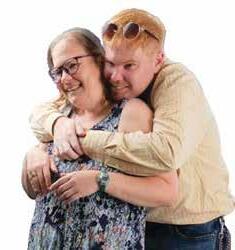Health &































In September 2020, to fanfare that in cluded an outdoor ceremony at the White House, Israel normalized relations with the United Arab Emirates and Bahrain. Three months later, Israel re-established diplomatic relations with Morocco after a 20-year break.
Known as the Abraham Accords, this public acceptance of Israel by the Arab nations was engineered by the Trump administration. Sudan signed onto the ac cords in January 2021 but normalization with Israel remains in limbo.
The Abraham Accords came 41 years after the groundbreaking 1979 treaty be tween Israel and Egypt and 26 years since Israel and Jordan signed a treaty in 1994.
Sharaka — an Arabic word meaning “partnership” — is a non-profit, non-gov ernmental organization created to pro mote anticipated benefits of the Abraham Accords, primarily through people-to-peo ple engagement of Israelis with Emiratis, Bahrainis, and Moroccans.
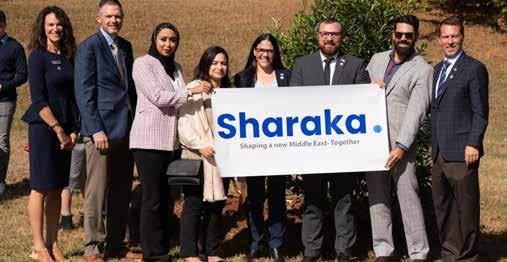
Delegations organized by Sharaka visited Atlanta in August 2021 and this past March. A third came to town on Nov. 1, facilitated by Israel’s Atlanta-based con sulate in the Southeast.

In a meeting with the AJT, Dan Feffer man, an Israeli and Sharaka’s director of communications and global affairs, said that funding comes from private donors and foundations in the U.S. and Israel. The organization is registered as a non-profit in Israel and Bahrain and plans to register in Morocco. U.S. donations are channeled through the Central Fund of Israel, a Ce darhurst, New York-based non-profit with 501(c)3 status from the Internal Revenue Service.
Fefferman said that the Abraham Ac
cords have created a “paradigm shift” in the Middle East, as Arab governments that in the past might have kept contact with Israel on the “down low,” appear more willing to extend a hand publicly.
“We need to give time, to see that this dynamic is real,” said Ibtissame Azzaoui, a member of Sharaka’s advisory board and a former member of the Moroccan parlia ment, who last year was elected to the city council in Rabat, the nation’s capital.
The past two years have seen a surge in Israelis — both for business and tour ism — traveling to the UAE, Bahrain, and Morocco, but “We have not yet seen tour ism from any of these countries to Israel,” said Fefferman.
The Israeli newspaper Haaretz re ported in September that, thus far in 2022, Israelis had logged some 500,000 passen gers on round-trip flights to Dubai, the most populous UAE city. The Moroccan
government reported that 15,000 Israelis visited during Passover in April and that 200,000 were expected throughout 2022.
On the other hand, the Israeli Tour ism Ministry reported that since the sign ing of the Abraham Accords, only 3,600 tourists from the UAE, Morocco, and Bahrain combined had visited Israel. The ministry attributed the low number to Is rael not reopening to foreign tourists until March 2022 because of the COVID-19 pan demic.
If there is an obstacle to more wide spread acceptance of Abraham Accords, below the level of societal elites, it is the issue of Israel and the Arab populations in the West Bank and Gaza.
“The Palestinians have held back di plomacy across the region for too long. Elites in the region understand full well that there have been multiple peace deals on the table for over 20 years, that have been rejected,” Fefferman said. “There are too many interests at play to be held back.”
Fatema Alharbi, a Bahraini and di rector of Gulf affairs for Sharaka, is an author whose works of fiction focus on women’s lives. She estimated that 70-80 percent of Bahrainis initially opposed the Abraham Accords. “People are not com fortable because of the Israeli-Palestinian issue,” though opinions change as Bah rainis meet Israelis on an individual basis, she said.
Alharbi attempted to thread a needle, saying of Bahrainis in general (exempting herself): “We don’t have a problem with the Jewish people. We have a problem with the Israeli Jewish people,” stemming from the Palestinian issue.
Where Bahrain traces its Jew ish population back several centu ries, Morocco’s dates to 70 C.E., the time of the Roman destruction of the Second Temple. During World War II, the late King Mohammed V shielded a Jewish population num bering more than 250,000 from roundups by the pro-Nazi Vichy government of France. Emigra tion began after Israel’s 1948 war of independence. Morocco’s Jew ish population today is estimated at about 2,000, while more than 1 million Israelis are of Moroccan de scent. Diplomatic relations severed following the Second Intifada in 2000 were re-established by King Moham med VI.
Azzaoui and Alharbi proudly noted the advance of women into prominent roles in their countries’ governments. Ambassador Houda No noo not only was Bahrain›s first female ambassador to the United States (2008-13), but also the first Jewish ambassador from an Arab country to the U.S.
The Sharaka delegation visited Atlan ta on the day that Israelis went to the polls for the fifth time in four years. The Times of Israel reported that on a recent visit to Israel, UAE Foreign Minister Abdullah bin Zayed warned opposition leader Ben jamin Netanyahu that should he again become prime minister, the inclusion of far right-wing legislators Itamar Ben Gvir and Bazelel Smotrich in his government would strain the still nascent ties between the two countries.
“It’s a new relationship. They have to now engage with Israeli society, with Israeli politics. It’s the only fully vibrant, maybe too vibrant, democracy in the re gion,” Fefferman said. The current Israeli government has been supportive of the accords and, he added, “I don’t see this changing,” even if leadership of the gov ernment changes.
“There are a lot of challenges here. The public opinion in the Arab world is a big one,” a situation that will improve as “people see the tangible benefits,” Feffer man said. “We share the same threats,” he continued, citing Iran and extremism.
While in Atlanta, the Sharaka del egation also visited the Atlanta Masjid of Al-Islam, the Hillel chapter at Georgia In stitute of Technology, and Morehouse Col lege. The group planted a “peace tree” in the city’s Freedom Park,


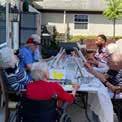

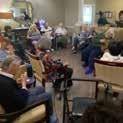


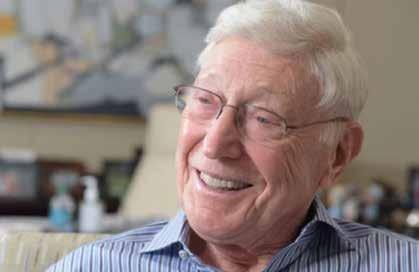 By Bob Bahr
By Bob Bahr
Bernie Marcus, co-founder of The Home Depot, has spent the last 20 years giving away his large fortune. At the Book Festival of the Marcus Jewish Community Center Sunday evening, Nov 6., he made a rare virtual appearance. The 93-year-old Marcus, whose generosity helped build the namesake community facility and who namesake in Dun woody, spent a lively hour discussing the lessons he has learned and the important people that have helped shape his long and successful career.
The event was sponsored by the Atlanta Jewish Times, which is also a major sponsor of this year’s festival. The newspaper’s publisher, Michael Morris, who is Marcus’s son, introduced the program.
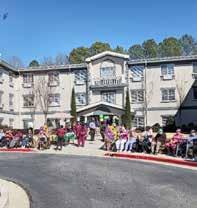

Many of the evening’s observations were taken from Marcus’s new book, "Kick Up Some Dust," co-written with Catherine Lewis, an assistant vice president and a history professor at Kennesaw State University. In his Sunday night book festival conversation with Lewis, Marcus credited his mother, a poor Russian immigrant, with providing the im portant lesson that stayed with him over the years.
“All the things I believe in, really came from my moth er,” he told Lewis. “My mother said the more you give, the more you’ll get. Never look back on bad things. Always keep positive thoughts in your mind. These are things that she taught me. But the most important one is, you have to give back.”
He particularly remembers, during the 1930s, look ing forward to getting a nickel from her for an occasional summertime treat, a Charlotte Russe, or “Charly Roose” as it was called on the streets of Newark, New Jersey where he grew up. It was a sliver of pound cake covered with whipped cream and a cherry. The sweet was set in a scalloped paper cup that you pushed up from the bottom as it was eaten. But he remembers, much to his disappointment that one nick el he thought was his, was instead dropped into the small pushkah or charity box his mother kept in their crowded tenement flat.
“What are you doing?” the disappointed young Marcus remembers asking his mother. “And she would say, "this is for charity, and you have to give it. This is what we do, we Jews. We give back to charity." I never forgot that, and I think it became part of my being – part of who I am. I hope that my children and my grandchildren feel the same way and will continue after I’m gone.”
It’s the reason he’s subtitled his book, “Lessons on thinking big, giving back and doing it yourself,” a personal philosophy of contributing to others that helped him shape the culture of The Home Depot that he led for almost 25 years. Today he believes it also provides the inspiration for his monumental philanthropy.
Over the years he has had an enormous impact on healthcare in Atlanta, with his gifts to Grady Hospital and Piedmont Hospital, the Shepherd Rehabilitation Center, the Marcus Autism Center of Children's Healthcare of Atlanta and nationally through his support for J Screen’s medical research at Emory University and elsewhere. He also built the Georgia Aquarium.
Marcus has been a primary benefactor of the Birth right program in Israel for young Jewish adults and recently began funding a similar program for Jewish high school stu dents to prepare them for the challenges of life on college campuses today.
“It is brutal out there,” Marcus said, in a direct state ment to the Marcus Jewish Community Center audience. “Those of you Jews out there don’t understand how serious this issue is today on the campuses in America. Antisemi tism is slowly but surely raising its ugly head. It’s like when I grew up in the forties, and in the fifties. I saw it every day of my life.”
And he had a challenge to those, who unlike himself have enjoyed financial success and have not done much to share their wealth. Marcus said he and the executive direc tor of his foundation, Jay Kaiman, have been on a crusade to
have those who are rich to open their wallets.
“I will tell you that Jay and I spent a lot of time on this subject. We have met a lot of people who have untold wealth nobody generally knows about. They’ve made tons of money and they’re sitting on it and doing nothing with it. The truth is that most of them want to do something. Jay and I have given – I don’t know how many lessons. We have sat with many mentoring about how to do it and how to get yourself involved. Get out of the shadows and give.”ì
Kick Up Some Dust: Lessons on Thinking Big, Giving Back, and Doing It Yourself is available on Amazon: https://a.co/d/eGjhFfv.
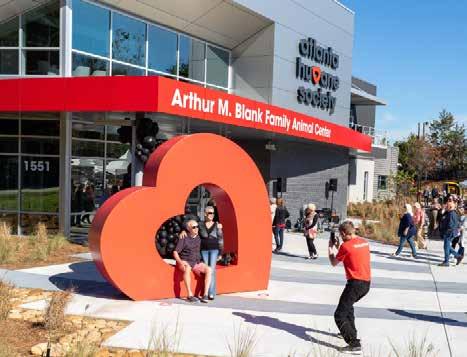

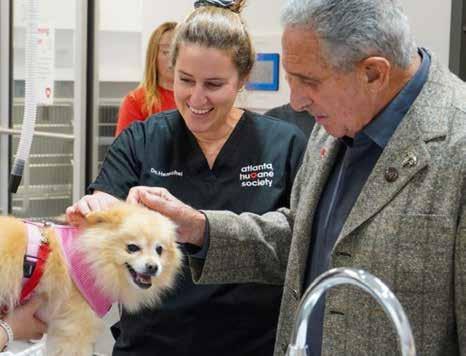
 By Bob Bahr
By Bob Bahr
Arthur Blank was only 15 when his father, Max, who was struggling finan cially to build a mail order pharmaceuti cal business in New York City, died sud denly. His mother, Molly, who had eloped at 18, to marry and raise her two sons, decided to take over the business.
With his father gone and his moth er spending long hours learning to be a businesswoman, Blank and his brother Michael often found themselves coming home from Stuyvesant High in Queens to a darkened and empty one bedroom apartment. That’s when Molly decided to get them a dog. Blank remembers it changed everything.
“After my father passed, the dog, in some ways filled that void for my brother and myself and even for my mother. It made such a difference to have an ani mal that we could love and would love us. And who was so excited each day to see us when we came home.”
Those years helped to sharped Ar thur’s ambition and drive. He went on to earn an accounting degree at Babson College outside Boston and begin a career in corporate finance that eventually led him to become co-founder of The Home Depot in 1978. Last December when the Atlanta Humane Society was raising money to build a new headquarters on the Westside, Blank remembered the dog that had meant so much to him at such a difficult time in his life.
His family foundation gave the orga nization $4 million to build the Arthur M. Blank Family Animal Center. It’s a mod

ern two-story building on a five-acre site that probably would not have come to gether as it did without Blank’s support. According to Cal Morgan, the president and CEO of the Humane Soci ety, Blank and his family spent considerable time working out the details of their gift.
“Arthur spent a lot of time with his family talking about this gift. They huddled at their ranch property in Montana as a family as they talked about doing this. His children and grandchildren are also big animal lovers. So, it was a real family thing for them.”
What the Humane So ciety, which is a no-kill animal shelter, created with Blank’s full support was not only one of the country’s most modern animal adop tion centers, but it has veterinary surgi cal facilities to treat animals needing spe cialized care and treatment.
Morgan says the Society has spent years envisioning what the future of ani mal welfare should look like, and he be lieves they have created one of the most sophisticated veterinary medical cen ters in this part of the coun try. Blank gets much of the credit for help ing to make the Humane Soci ety’s dreams come true.
“Mr. Blank’s com mitment was the key,” Mor gan says. “That was the rocket fuel that we needed to re ally propel the campaign to success. Our original goal was to raise $10 million to supplement the money we received from selling our old building. But we were able with his gift to leverage other givers. We actually ex ceeded our campaign, and we ended up raising $11.5 million.”
In recent years, particularly during the height of the pandemic there was a

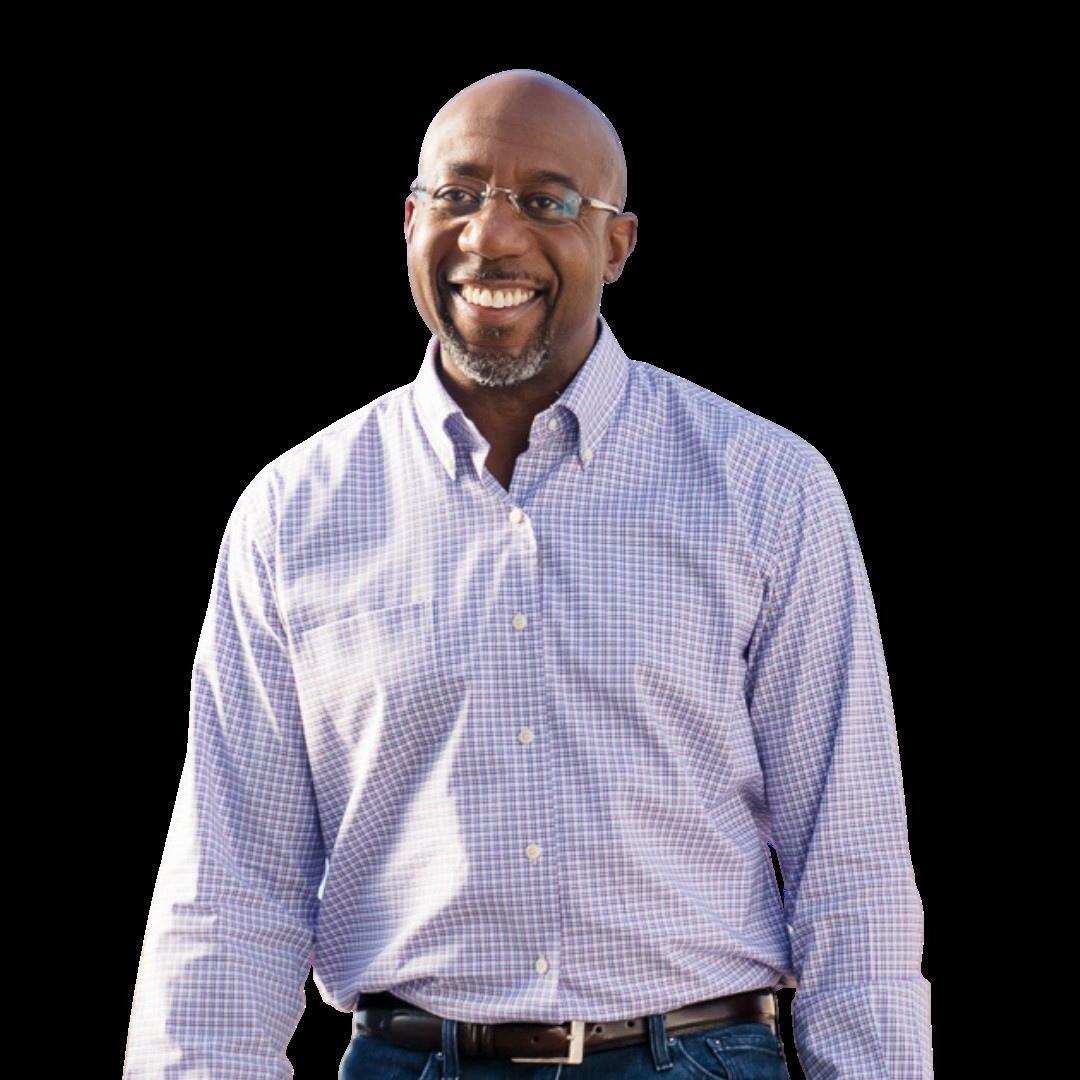







The antisemitic sentiment expressed by Ye, formerly known as Kanye West, hit close to home during the Oct. 30 football game between rivals Universi ty of Georgia and University of Florida. In what appeared to be a copycat version of Ye’s antise mitic rants, the electronic vid eo board at AIAA Bank Field in Jacksonville, Fla., where the game was held, read, “Kanye was right about the jews (sic).”
The same message appeared on a building in downtown Jacksonville that weekend, and banners were hung from a highway overpass on the city’s Interstate 10 and at Arlington Expressway that read, “End Jewish Supremacy in America,” “Honk if you know it’s the Jews,” and “Kanye Is Right About Jews.”
Though rivals on the field, leaders from both teams quick ly condemned the messages. The University of Georgia and the University of Florida released a joint statement de nouncing the billboard’s mes sage. The statement read, “The University of Florida and the University of Georgia together denounce these and all acts of antisemitism and other forms of hatred and intolerance. We are proud to be home to strong and thriving Jewish communities at UGA and UF, and we stand together against hate.”
As the national conversation contin ues about Ye’s antisemitic rants and the continued fallout, Black and Jewish leaders from across Atlanta are weighing in on the impact of his comments. Victoria Raggs, cofounding executive director of Atlanta Jews
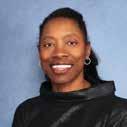
of Color Council, pointed out that Black Jews face both oppressions.
“Ye has been saying defamatory com ments about the Black com munity for a while. Racism and antisemitism are two wings of the same bird,” stated Raggs. She stressed that Jews and Blacks must be vigilant when racism of any form is encoun tered. “And other communities must stand in solidarity with Jews against antisemitism be cause it’s just another form of hate,” she stressed.
NAACP Atlanta Chapter president Richard Rose is in agreement.
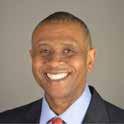
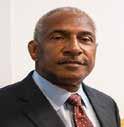
“There are no single-issue bigots. Ye has demonstrated he is a bigot in every sense of the word. I believe that even Black people can be white supremacists, as he’s clearly shown,” said Rose.
Rabbi Brad Levenberg of Temple Sinai, co-chair of the American Jewish Committee (AJC) Black/Jewish Coalition, affirmed the organization’s commitment to build bridges and celebrate the diversity. The organization has condemned Ye’s comments and those who are inspired by them to act out against others.
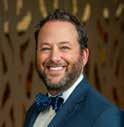
“We find comfort in the myriad of voic es that have visibly and audibly condemned these actions. As we continue to experience the rise of antisemitism and racism in At lanta, we know we are not immune to such activities,” said Rabbi Levenberg.
In Twitter posts on Oct. 9, Ye vowed to “go death con 3 ON JEWISH PEOPLE,” and said, “You guys have toyed with me and tried to black ball anyone whoever opposes your agenda” in reference to Jews. At the time, the
tweets were removed by Twitter. His com ments came days after he appeared dur ing Paris Fashion Week with Candace Owens in matching “White Lives Matter” T-shirts.
Shortly after his antise mitic tirade, Ye was dropped as a client by his Hollywood agency, Creative Artists Agen cy (CAA). Adidas, Balenciaga, Gap, TJ Maxx, Foot Locker, and Vogue have also severed ties with him. A completed docu mentary about his life that was set to be distributed has been shelved.
Eytan Davidson, regional director of the Anti-Defama tion League Southeast, indicat ed that many white suprema cist groups have picked up on the antisemitism espoused by Ye. In fact, Davidson men tioned that the Goyim Defense League has been named as the perpetrator of both the Jack sonville and Los Angeles inci dents.
“Occurring near the fourth anniversary of the Tree of Life Syna gogue shootings, this display of antisemi tism is unacceptable and out rageous,” he said. Despite the antisemitic vitriol, however, Davidson was encouraged by the speed and strength of the statements made by both University of Georgia and Uni versity of Florida, the South eastern Conference (SEC) and the Jacksonville Jaguars orga nization condemning the inci dents.
For decades, The American Jewish Committee (AJC) has been a force in fighting
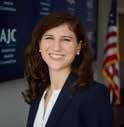
antisemitism and building coalitions with other communities. Associate Director Ju lie Katz pointed out that while Ye’s comments are overtly an tisemitic, there are less obvious forms that are equally danger ous and damaging.
“Some people feel more comfortable expressing their antisemitic points of view ‘in code,’ so to speak, and these messages are just as danger ous. Age-old tropes about Jew ish control of the media, gov ernment and banks are part of this false narrative,” she said.
Mark Dawson, co-chair of the American Jewish Commit tee’s Black/Jewish Coalition, said, “Ye has been structurally checked through the loss of nearly all of his corporate part nerships, including Gap and Adidas. I believe these state ments and actions are neces sary, important, and appropri ate.” Yet, he cautioned, “Any victory laps in checking the repugnant actions of individu als like Ye should be postponed until we get to the root of the institutions that produce them.”

The AJC has several re sources available to help com bat antisemitism, including a recent piece, “Take Action: 6 Ways to Combat Antisemitism after Kanye West’s Remarks,” which can be found at www.ajc. org/news/take-action-6-waysto-combat-antisemitism-afterkanye-wests-remarks. In Janu ary, the organization will issue



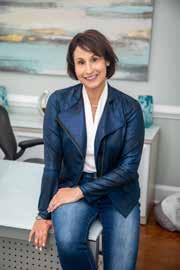




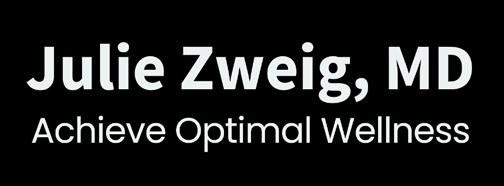

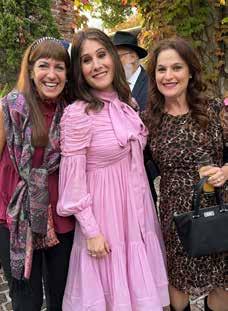 By Marcia Caller Jaffe
By Marcia Caller Jaffe
On Oct. 24, Dena and Rabbi Eliyahu Schusterman glowed as they shared the limelight, recognizing the contributions of others in tandem with their own 26 years of leadership at Chabad Intown. Dena explained, “Twenty-six is signifi cant because it’s the numeric name for Hashem and fitting to celebrate this mile stone…also because 25 was too ‘COVID-y” [to celebrate].”
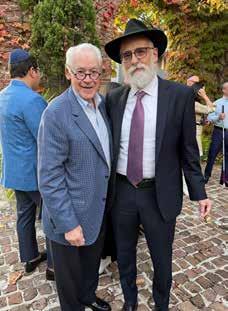

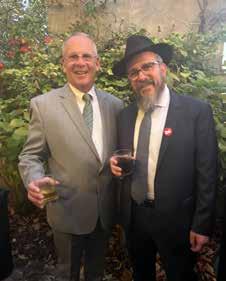
She also announced the coincidence of Rabbi Schusterman’s 49th birthday to rousing applause.
During the hour-long reception at Summerour Studio on Bishop Street, guests mingled sharing stories about Chabad Intown’s beginning and relation ships throughout the years.
Developer Anosh Ishak recalled, “There I was in 1995 at the zoning office, and I see this young rabbi (Eliyahu) doing the same thing. After we met, I made it a point to stay connected.”
Rabbi Dov Drizin laughed, “I may be Eliyahu’s earliest friend. At 12 years old, we were in the same school. I also take credit for being the matchmaker to con nect him to Dena. More importantly, he is a wonderful mix as he is both spiritual and cerebral, a doer and a ‘feeler.’”

The formal program inside was a mix of speakers and an on-point video com prised of photos of the sentimental jour ney of the young Schustermans, starting with the preschool up to Rabbi Schuster man’s business “sechel” in having the vi sion to buy the Beltline property in parts as two separate deeds, and his ability to raise the money to do it. Donors and sup porters appeared in the video like Ian and Carol Ratner, who referred to the couple as “unflappable with a very cool attitude.” Schusterman was touted for seeing the potential under the surface in the Intown market as the suburbs seemed to be expe riencing rapid expansion.
The video paid great tribute to Dena Schusterman’s education philosophy in establishing the Intown Jewish Academy with her combination of modern values, enthusiasm, and immersing children in understanding who they are. Supporters Leslie Zinn and David Frolich comment ed on the value of this education.
Special tribute was paid to the Young Professional Award recipients: Andres Bibliowicz, Nathan Kaplan, and David Weinstein, who donated their business and real estate expertise.
The video highlighted Susan Eisen stein who spoke of her late husband, Ber
nie, and his deeded gift to Chabad, and of the Kaus family, who endowed “Jeff’s Place” to help with those suffering from addiction, in memory of their late son, Moishe Jeff Kraus.
Barry Koch, Joy Maxey, Alan Pinstein, Chana Perloe and Howard Kaufman, Ryan Leveson, and Michael and Mindy Planer, were recognized in addition to those mentioned herein.
Rabbi Yossi New closed the video by complimenting how Chabad Intown serves as a moral compass in a society that “can have some poor moral values.” He concluded, “May you continue to be a beacon of light.”
The live program began with an in troduction by Motik Schusterman, the couple’s oldest son, as he entered to mu
sic from the science fiction classic, “Star Wars.” He was told to speak from the heart and that he did.
Later, Dena spoke of the mitzvah of the timing of the Hakhel ceremony, or “gathering together,” to read from the Torah every seventh year, and the impor tance of teaching conscious acts of kind ness. Rabbi Schusterman shared his pride in “having no debt and paying the staff on time consistently.” He thanked donors and ended with appreciation of Dena as his life partner “in keeping him humble and the glue that holds it all together.”
Original framed art was passed out to honorees. A sequin-clad auctioneer took to the stage to raise money from bids as generous contributors stood and some challenged others to do the same.
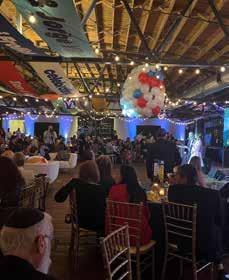
Guests left with a gift bag of Chabad anniversary socks, 26th anniversary cookies, matches and a book by Rabbi Gershon Schusterman, “Why G-d Why? How to Believe in Heaven When it Hurts Like Hell.” The book details his experi ences at age 38 when his wife passed away, leaving him with 11 children.
Inside the dining hall, Eli Brafman, of EB Caterer, loaded both ends of the room with delicacies from chicken and salmon to a sprawling salad bar in the middle. The Afro-Klezmer Orchestra turned up the volume with “Vah Meir Bis du Shane,” which means that “you’re grand,” and, in this case, the honorees are just that.
Chabad Intown is located at 730 Ponce de Leon Place in Atlanta. ì




Some of America’s top business lead ers were in costume, dressed for the job they want, or already have, at PINK’s 18th annual Fall Women’s Empowerment luncheon on Oct. 31, at the InterConti nental Buckhead Atlanta. More than 200 guests attended in-person and another 270 participants, a group comprised of ambitious women, emerging leaders, and male advocates, chose to livestream the showcase.

To illustrate the event’s superhero theme, Aprio Wealth Management CEO and managing partner Richard Kopel man appeared in a pink mask and cape as the only male on the “power panel.”
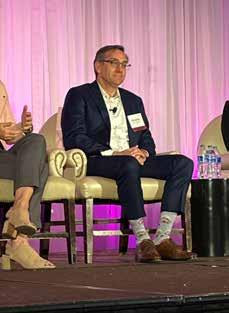
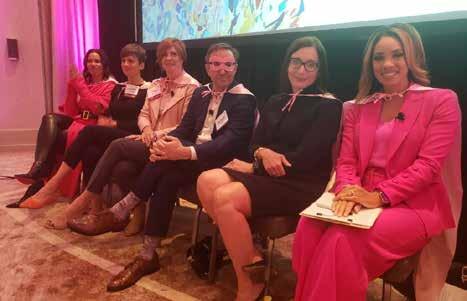
Local celebrity, poet, and former TV anchor Cynthia Good, who started and nurtured the PINK platform, served as the event’s emcee and was energetic, speaking with clarity, emphasis, and passion. She began by quoting a McKenzie study, citing that there is still one woman for every four men in leadership positions, and one person of color out of 20 in C-suite, or executive level, posi tions.
The bi-annual event concentrated on diversity and inclusivity in the work place by sharing the experiences of top leaders who have moved into C-Suite roles.
“We have an extraordinary group of leaders who are willing to share their success secrets,” said Good. The panel, in addition to Kopelman, included: Ju lia Houston, chief strategy and market ing officer, Equifax; Chris Robins, busi ness unit CEO, home appliances, Newell Brands; Julienne Smith, chief develop ment officer, IHG Hotels & Resorts; and Brandi Thomas, group VP, chief audit exec, General Electric. The event mod erator was Courtney Bryant, a news an chor for Fox 5 Atlanta, WAGA-TV, where Good formerly anchored the weekend news.
Featured leaders addressed pivotal changes in the workplace, how those changes affect organizations and women in particular, and how women can get more of what they want at work.
“This is key today as we grapple with the protracted pandemic which has overhauled the way we work and want to live,” said Good. “With workplace dis engagement at record levels, women es pecially are overwhelmed. According to a small PINK poll this summer, 56 per cent said workplace engagement has de clined. We can all use new tools to create
the career and life we want.”
Kopelman, who serves on the boards of Alexander Muss High School in Israel, Israel Bonds for the Southeast and The Weber School, was the lone man on the lively panel. He held his own by sharing about his upbringing by a single mother in Miami Beach, for whom, at age 13, he made cold calls to set up her job selling funeral packages.
She showed Kopelman how strong and capable women can be. He added, “Now, at 87, she still gives advice.” Kopel man commented on the female employ ees who didn’t return to work coming out of the pandemic for various reasons. Later, all the panelists agreed on the posi tive role of virtual work models while also agreeing that being in-person in an
office is very important for creativity and being seen for advancement.
One of the strongest panel topics was the importance of diversity. Kopel man cautioned when dealing with co workers or employees who are not sold on the benefits of diversity, and said, “I tell them they need to get with the pro gram.”
Others echoed measurable reasons of dealing data, in that companies which value these differences have higher reve nues to show for it. Also agreed upon was the importance of being respected versus fretting over being liked. “Be yourself” were the code words.
Kopelman teased the audience that, on the following day, Aprio would make a major announcement; and on Nov. 1,
Aprio did indeed reveal their merger with the Washington, D.C. firm Aronson LLC, combining $325 million in revenue with both these historic and complemen tary business advisory and CPA firms.
Good then took questions from the virtual watchers and the live audience before she awarded raffle prizes of stays at the new Nobu Hotel in Buckhead and Canyon Ranch.

Local PINK supporter Martha Jo Katz summarized to the AJT, “The out standing panel shared valuable advice that provided the audience with ideas for career advancement. They said they try to pass their ideas forward to help others be successful. We all have to have men tors. I also believe we have to believe in ourselves and be our own advocates!” ì
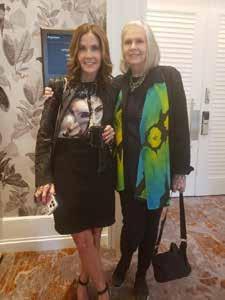
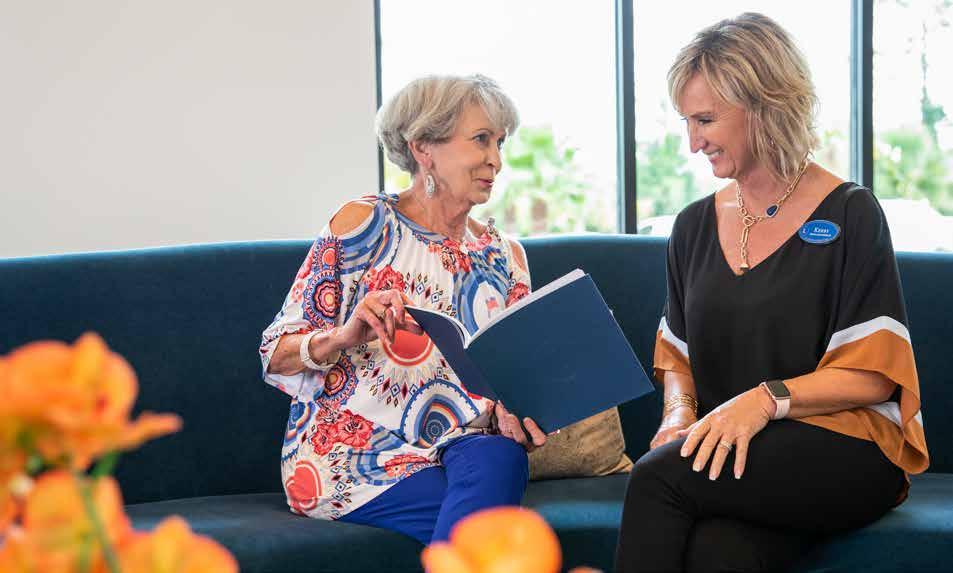



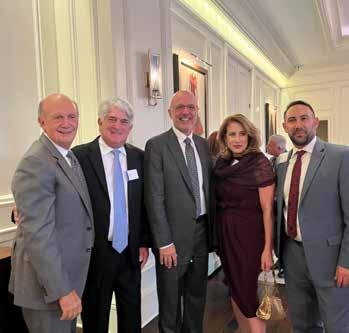 By Marcia Caller Jaffe
By Marcia Caller Jaffe
On Nov. 3, more than 400 movers and shakers heralded the American Jew ish Committee’s National Human Rela tions Award Gala at Buckhead’s St. Regis Hotel, saluting Invesco CEO Marty Flana gan.
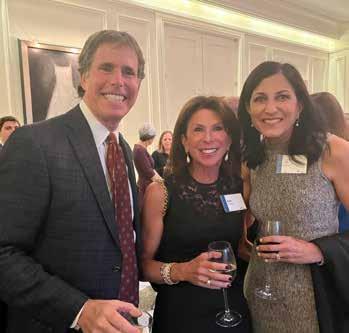
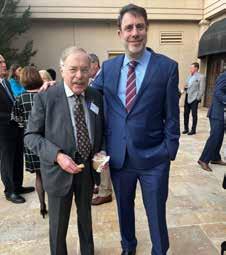

Dov Wilker, American Jewish Com mittee (AJC) Southeast regional director, interviewed new AJC chief executive of ficer Ted Deutch, who joins the organiza tion after 12 years of service in the U.S. House of Representatives (Florida). The event was co-chaired by Doug Hertz and Jim Hannan with honorary chairs Dr. Valerie Montgomery Rice and Dr. Jon Lewin.
The pre-function cocktail hour fea tured a well-heeled, diverse crowd. Three high school seniors raved about their roles in the AJC Leaders For Tomorrow program. Gavin Friedman relayed his ex posure and sensitivity to his late grand father, and Holocaust survivor, Norbert Friedman, and how AJC broadened his horizons, as he also advocates for the LG BTQ+ community.
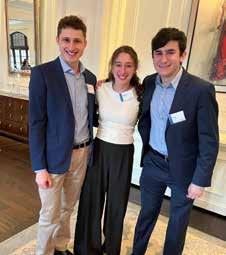
Audrey Zeff said, “Since I go to public school, I needed to learn how to discuss both sides of controversy in a respectful and impactful debate.”
Blake Schwartz valued AJC training on antisemitism as it relates to the Israe li-Palestinian ongoing conflict. Former local AJC president Melanie Nelkin was looking forward to welcoming Deutch as she chatted with Dawn Watkins, Atlanta Jewish Film Festival donor relations man ager. Rabbi Peter Berg, senior rabbi at The Temple, chatted with Steve Berman about honoree Flanagan’s proximity as Invesco’s office is adjacent to The Temple on Peachtree. Jill and Greg Paradeis wel comed Deutch’s wife, Jill.
Inside the chandeliered ballroom, Rabbi Berg offered his invocation, which was comedic and sentimental in nature as it included prayers for topics like the return of the stock market, not getting calls from kids asking for money, no acts of terror, and, ultimately, good health.
Craig Kaufman, current president of AJC Atlanta, narrated in between a slide presentation which included comments from Hispanic Jew Dax Lopez on his own emotional first-time trip to Israel. Kaufman praised the $520,000 raised for that night’s event.
Always a thought-provoking, onpoint interviewer, Wilker queried Deut ch on the most relevant topics, starting with why Deutch walked away from
Congress. Deutch, who served seven terms in Congress, worked on the Abra ham Accords, was a founding member of the House Bipartisan Task Force. He also chaired the House Ethics Commit tee and was a senior member of the House Foreign Affairs Committee, chair ing the Middle East, and North Africa Counterterrorism Subcommittee. His reply to Wilker’s query: “Just turn on the TV.” Just five weeks into the job, Deutch plans to bring his skills in focus and strength to the AJC.
Wilker then referred to the recent antisemitic markings at the Brookhaven MARTA station and the threats toward synagogues in New Jersey that were dis covered by the FBI. Deutch is counting on opportunities presented by the AJC’s
Black Jewish Coalition.
Wilker then discussed the impor tance of corporate leadership in dealing with the issue recently exposed by Kanye West’s public antisemitic tirades. Wilker pointed to the yellow and blue flower centerpieces as a salute to the Ukrainian struggle. Deutch noted that his own fa ther received a Purple Heart in the Battle of the Bulge and his value of democracy. Deutch also spoke of his admiration for late Georgia Congressman John Lewis.
Local business leader Doug Hertz, president and CEO of United Distribu tors, Inc., began a tribute to Flanagan, labeling him as “a stealth servant leader.” Hertz added that Flanagan helped resolve issues involving pensions in Atlanta and chaired the Metro Atlanta Chamber of
Commerce during the pandemic and was instrumental in bringing companies like Microsoft to Atlanta.
Hertz laughed, saying, “The timing was not exactly perfect with a health crisis, but he showed the best leadership even then. He also helped get hate crime legislation passed in Georgia.”
A modest Flanagan graciously and briefly accepted the award after explain ing his values of diversity of thought in driving motivation and collectively ad dressing intolerance.
The AJC works to enhance the well being of the Jewish people and Israel, hu man rights, and Democratic values for all. For over a century, AJC has strived to forge alliances and build global bridges of mutual respect. ì
At Renaissance on Peachtree, we specialize in retirement living, because you deserve the very best. That’s why your beautiful apartment home is spacious and well-appointed – making it the ideal place to relax or to entertain.

Housekeeping, maintenance and delicious dining? They’re included for your comfort and convenience.
Add in the easy access to wonderful services, amenities and programs right outside your door, and you can live worry-free, confident in the community of friends you build among residents and team members.
It’s luxurious community living, done right.
 By Bob Bahr
By Bob Bahr

Photographer Jason Langer spoke at Kennesaw State University’s Museum of History and Holocaust Education on Nov. 8, to commemorate the 84th anniversary of Kristallnacht or Night of the Broken Glass, as it is sometimes called. The event memorial ized one of the important turning points in the Nazi Holocaust in Europe.
On Nov. 8 in 1938 the Hitler government began two days of attacks on Jewish owned businesses, synagogues and other Jewish institutions to formally initiate the active annihilation of Jewish life in the country. Over 7,000 Jewish businesses were destroyed or damaged, 267 synagogues in Germany, Austria and the Czech Sudetenland were destroyed, and 30,000 Jewish men were ar rested and sent to concentration camps. The event was said to have foreshadowed the de cision in 1942 to implement what the Nazis euphemistically called, “The Final Solution.”



For Langer, the rampage in the German streets and other territories they controlled, has become a symbol of the troubled rela tionship with Germans and is remembered to this day. It helped to motivate his return to
Germany in 2009 to examine that relation ship through the lens of his camera. He spent five years repeatedly returning to Berlin, the German capital to photograph reminders of the Nazi era that are still a part of the city’s life. In an interview he said the project pro voked, in a sense, a catharsis, in his feelings about what happened there so many decades ago.
“I was instantly brought back to those feelings about not only Germany and Ger man people but thinking of Berlin as the seat of the “Third Reich.” And so, I took it upon myself to go there and photo graph important places, his torically, for Jewish people but then also just get a sense of the city itself as it is now, because I know it’s changed a lot.”
On his repeated visits he crisscrossed the city, taking thousands of pictures that he culled for the exhibit at KSU, some extraordinary and some very ordinary. There is a strik ing image of the ornate facade of what remains of the An halter Bahnhof, the old train station from which at least 50,000 Jews were shipped to the extermina tion camps in Eastern Europe. In the north ern suburbs of the vast city, which stretches 23 miles northward and 28 miles east to west there is Sachsenhausen, one of the earliest concentration camps. Langer photographed the crematorium, still intact and the eerie long tunnel where so many Jews walked to their deaths.

He also photographed the Memorial to the Murdered Jews of Europe, near the Brandenberg Gate, designed by the New York architect, Peter Eisenman. Across an open space of nearly 60,000 square feet, there are 2,711 grey concrete boxes in rows of vari ous heights that encourage visitors to walk among them. All these structures are a re minder to Langer that “history can be found in the city’s architecture everywhere.”
The exhibit at KSU is based on a pub lished large format book of his photographs of Berlin which contains several short, but insightful, essays about the experience of liv ing with the horror of what happened there.
A German Jewish essayist, Shelly Kupferberg eloquently writes of her emotions that she lives with each day in a country where many Jews died.

“Grief, escape, pain, vio lence, expulsion — these exact experiences exist surely in ev ery family,” Kupferberg points out. “What does not, however is the thought of being exter minated. The thought remains incomprehensible to this day, and it asks so much of you.”
In his lecture at the exhib it, Langer also addressed those feelings that came to him as a flâneur, a French noun that connotes a thoughtful explorer of urban spaces. As he men tioned in his lecture, despite his long strolls through the city, the experience left him “feeling haunted in a certain way.”
“You feel these Jewish ghosts,” he told me, “And feel and hear their stories every where you go.”
But Langer did not just speak of the past in his Kennesaw lecture. He saw in the faces he photographed on the streets of a new gen eration, with new ideas. There is even some thing of a renaissance, as he described it, of Jewish life in Germany today. Even though many Jews thought they would never, ever return, there has been a significant move ment back to Germany, even by young Israe lis. Still he says, his impression, after his long walks in Berlin and nearly 85 years of history since Kristallnacht is there remains much to be done.

“There is a kind of outsider-ness that Germany is still dealing with when it thinks about Jewish people, and they are trying to do whatever they can to overcome that. So, there is a real active daily attempt at reintegration of the Jews.” ì







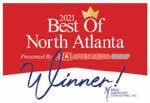
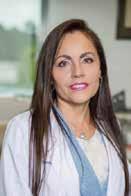
Local art impresario Fay Gold hosted an art opening on Oct. 22 at Buckhead Art & Company. The show’s star was Amy Rader, known for her large-scale imagery, often displayed in hospitality spaces and important private residences; and Mar lene Rose, a glass cast sculptor. Ever the hawk eye for talent, Gold was described by Rose as “an Atlanta icon and art galler ist extraordinaire who has worked with many of the ‘greats’ in the art world, from Neoexpressionist Jean-Michel Basquiat to Robert Mapplethorpe,” a controversial photographic artist known for his sexu ally explicit images.
Rose, who attended Tulane Univer sity, was raised in New York. She was previously featured on CBS’s “Sunday Morning” and has been working for the past 30 years on a relatively new casting technique where she pours liquid molten glass into a sand mold which then cools for a week before she unearths its beauty.
One of the highlights of the show was her “Butterfly Mandala” consisting of 28 glass butterflies arranged in concentric circles. (A mandala is a geometric con figuration of symbols.) Her “Japanese Ki mono,” which was cast out of seven pieces of glass, was located center stage for the show. She also displayed treatments of Buddha’s horses and abstract pieces. The Mandala piece was offered at $99,000, the “Three-Headed Buddha at $24,600.
Of Rose, Gold said, “I have exhibited Marlene’s sculpture for over two decades. She has explored a difficult technique and pushed the boundaries of contem porary art. She is a trail blazer drawing inspiration from the spiritual contents of ancient cultures. She has achieved in ternational recognition as a woman art ist in museums and galleries around the world. One might say ’she is the Buddha’ by her own living in the moment.”
A graduate of Art Institute of Atlan ta, Rader has carved out a unique niche with her treatments of traditional art and large-scale pieces seen in private col lections, luxury high rise buildings, res taurants, and corporate offices. She was selected by Tesla and Microsoft to repre sent them at Miami’s Art Basel. Rader en joyed the success of the evening and the day of. She related, “A collector snapped up three of my pieces during installation before they were even hung for the Satur day show. Then bought two more pieces soon after.”
Gold said, “Amy is admired for her technical skills, precise draftsmanship,
and often striking and bizarre images. In a surrealistic style, she explores sub conscious imagery in worlds of animals, fashion, rock fragments, light and peo ple. Samples of Rader’s work that night were “Dreamcatcher No. 4” at $11,500, and “Rhett” at $16,000.
Vibrant owner of Buckhead Art & Company, Katie Jones interned at the gal lery before taking it over four years ago.

She enjoyed mingling with the Jewish fan-based show and introduced her fian cé, Alberto Mizrahi, owner of Sky Shield Roofing.
Collector and Buckhead neighbor, Joanne Truffelman, who had just re turned from a whirlwind tour of New York City museums and theatres said, “Aren’t I lucky to have Fay as a dear friend, and, of course, she helped me
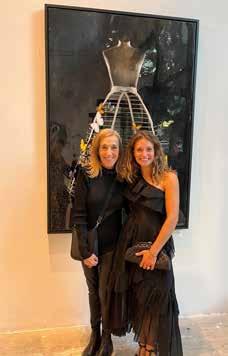
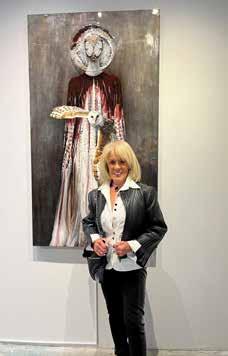

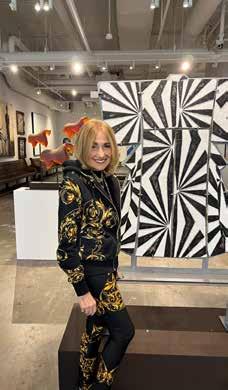

with the art and design in my apartment in her wonderful taste.”
Not part of the special exhibit, the gallery also featured unusual works by Daniel Maltzman, David Schwartz (known for his treatment of the Ameri can flag and seascapes), and Mark Boom ershine, among others. An original Andy Warhol soup can dress (1962) was avail able at $28,000. ì

 S. Reingold, MD, Integrative Heart and Vascular Care
S. Reingold, MD, Integrative Heart and Vascular Care
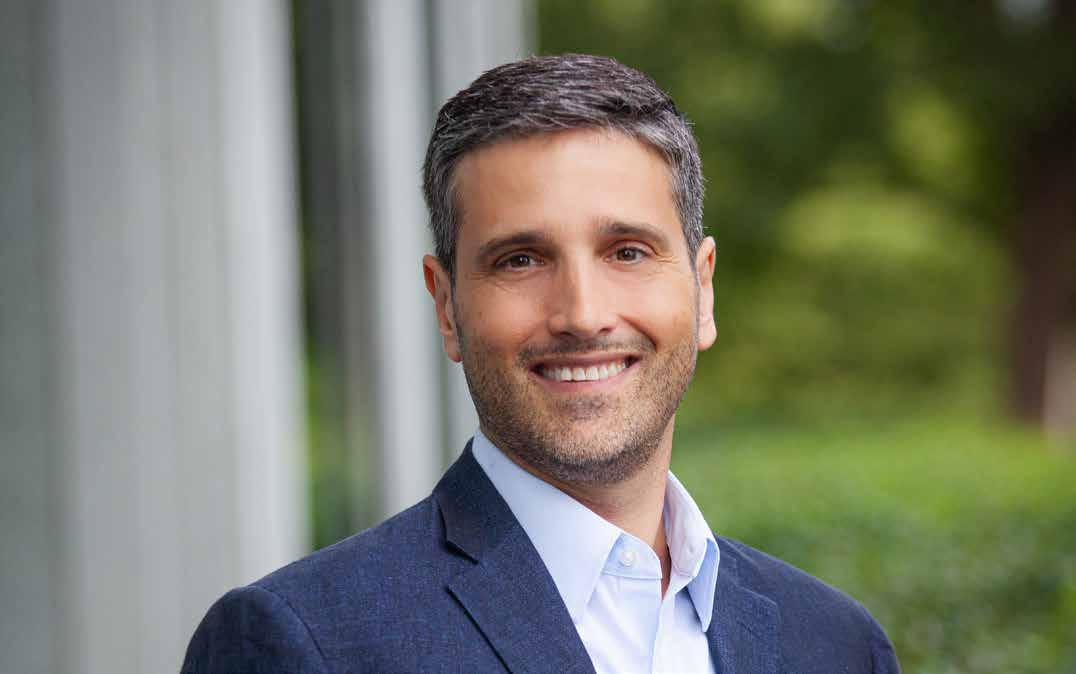
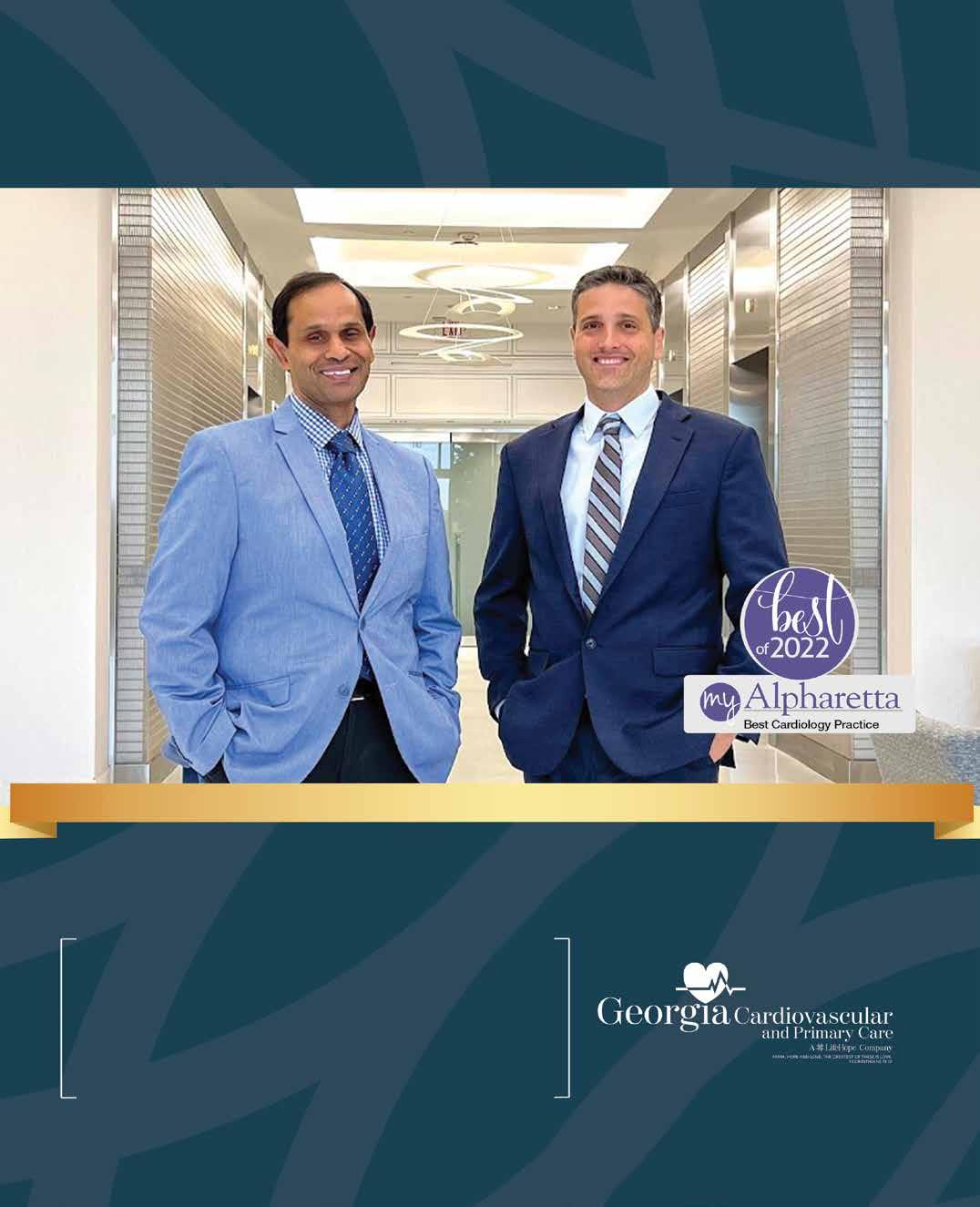
Seven hundred — that’s the number of days between Jan. 5, 2021, when run offs in Georgia determined control of the U.S. Senate, and Dec. 6, 2022, when another runoff may impact the balance of power.
In the Nov. 8 general election, out of nearly 3.93 million votes cast, a shade more than 35,000 votes separated incum bent Democratic Sen. Raphael Warnock’s 49.42 percent from Republican challeng er Herschel Walker’s 48.52 percent. It was the 2.07 percent received by Libertarian Chase Oliver that created the need for a runoff, as Georgia requires that the win ner of an election receive a majority of the votes cast.
Apparent Democratic Senate victo ries in Arizona and Nevada would give the party 50 seats and continued control of Senate, with Vice President Kamala Harris holding the tiebreaker. A Warnock victory would provide a cushion should a colleague not vote with the party.

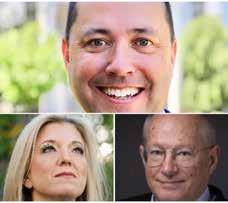
One of the changes made by the Republican-controlled legislature to Georgia’s voting rules and procedures after the 2020 election halved the time between a general election and runoffs, leaving Warnock and Walker with a 28day sprint to the finish line.
Registered voters who did not cast a ballot in the general election may still vote in the runoff. The deadline to reg
ister was Nov. 7. Requests for absentee ballots must be received by Nov. 28. By law, early voting must begin by Nov. 28, though the state’s 159 counties have the option of opening polling stations ear lier. Early voting ends Dec. 2.

Just shy of 57 percent of Georgia’s 6.95 million active registered voters cast general election ballots (another 886,00 are classified as inactive); 2.5 million of them in early voting. The first step in making official the unofficial results is for counties to meet a Nov. 15 deadline to certify their vote counts. Secretary of State Brad Raffensperger then certifies the results, perhaps as soon as Nov. 21, af ter which early voting may begin.
Warnock and Walker are engaged in an effort to martial the necessary re sources, particularly millions more dol lars to fund a continued onslaught of ad vertising. The prime beneficiaries of the Georgia runoff may be the television and radio stations selling advertising time to the campaigns.
According to OpenSecrets.Org, which tracks the intersection of money and politics, Georgia’s Senate race — at $271.3 million — was the second most expensive Senate race (combining spend ing by candidates and outside groups), exceeded only by Pennsylvania’s $376.3 million.
By comparison, the January 2021 Senate race between Democrat Jon Os soff and then-incumbent Republican
The U.S. Senate race shared the gen eral election marquee with the guberna torial contest in which incumbent Re
publican Gov. Brian Kemp won a second term. Kemp received 53.4 percent of the vote to 45.9 percent for Democrat Stacey Abrams, in a rematch of the 2018 elec tion.
There appears to have been consid erable ticket-splitting in the Senate and
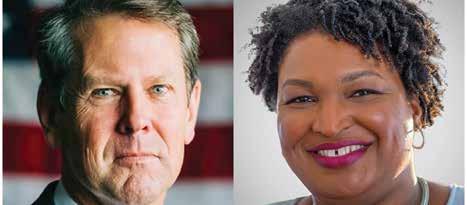
gubernatorial contests, as Kemp received 203,000 more votes than Walker and Warnock received 132,000 more votes than Abrams.
Republicans won seven other statewide races. Among them, Raffensperger defeated Democratic state Rep. Bee Nguyen to win a second term as overseer of the state’s elections and business licensing. In the race to succeed Republican Geoff Duncan as lieutenant gov ernor, state Sen. Burton Jones defeated Democrat Char lie Bailey. Attorney General Chris Carr turned back a challenge from Democratic state Sen. Jen Jordan to win a second term.

Republicans maintained their majorities in the state House and Senate. When the General Assembly reconvenes in January, House district 51 will be repre sented by Jewish Democrat Esther Panitch, who defeat ed Jewish Republican Peter Korman. In House district 25, Republican Todd Jones, whose mother is Jewish, won re-election. In House district 121, Jewish Democrat Jeff Auerbach lost his election bid.
There were no surprises from the state’s 14 con gressional districts. Metro Atlanta incumbents Demo crats Hank Johnson (4th district), Nikema Williams (5th district), and David Scott (13th district) were victorious, as were incumbent Republicans Barry Loudermilk (11th district) and Marjorie Taylor Greene (14 district).

Incumbent Democrat Lucy McBath, who has served two terms in the 6th district, won election in the 7th, while Republican Mark McCormick was victori ous in the 6th. McCormick’s win gained Republicans a ninth seat in the congressional delegation with Mc Cormick’s win.




The 6th had been in Republican hands for 40 years until McBath’s 2018 victory. In the redistricting that followed the 2020 Census, the Republican-controlled legislature redrew boundaries to make the 6th more Republican-friendly and the 7th favorable for Demo crats, prompting McBath to jump districts.
The mid-terms were the largest test yet of the changes in voting laws made by the legislature in the wake of disproven claims of widespread fraud in the 2020 election. Election officials said that there were relatively few problems, aside from several polling sites that stayed open later than scheduled to make up for technical issues earlier in the day. ì
Sheba Medical Center, Israel’s larg est medical center and a Newsweek top-10 ranked world’s best hospital for the last four years, announced the results of an interna tional study examining the use of a novel ce liac plexus radiosurgery treatment for pain management in advanced cancer patients.
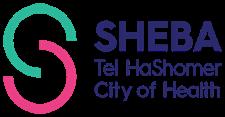
The study will be presented by lead author Dr. Yaacov Richard Lawrence at the 2022 American Society for Radiation Oncol ogy (ASTRO) annual meeting in San Antonio.
A common symptom of pancreatic cancer is severe pain in the abdomen or mid back, which worsens with time and is often challenging to treat. The pain is thought to be caused by the tumor pressing onto and infil trating the celiac plexus nerve network that lies immediately behind the pancreas. Dr.
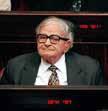
Lawrence, director of the Center for Transla tional Radiation Oncology at Sheba Medical Center, and his team hypothesized that tar geting the celiac plexus with radiation would reduce pain, and after a positive pilot study, embarked on a four-year validation study of 125 patients.
“Pancreatic cancer pain can be debili tating for patients, and few options are cur rently available for alleviating it,” said Dr. Lawrence. “The positive results of this study are encouraging, and we believe celiac plex us radiosurgery should become a standard treatment option for pain relief for patients in their advanced stages of pancreatic cancer and other cancers invading the celiac plexus nerve.”
Patients’ pain interference scale scores, which measure how much the pain inter feres with their everyday lives, improved significantly both three and six weeks after receiving a single radiation treatment. Of the 90 evaluable patients at three weeks after ini tial treatment, 48 (53.3 percent) had at least a partial pain response, with the average pain score dropping 2.5 points at three weeks and 3.2 points at six weeks. The treatment was well tolerated by study participants, whose median age was 65.5, and no severe side ef fects were reported.
Compiled by TOI Staffvelopment and to prevent a repeat of the wa ter shortage experienced during the War of Independence.
Nov. 19, 1957: Ofra Haza is born in Tel Aviv to parents from Yemen. She is named Israel’s Singer of the Year annually from 1980 to 1983, finishes second at the 1983 Eurovi sion and voices Moses’ mother in “The Prince of Egypt.”
(From left) Israeli businessman and philanthropist Alexander Machkevitch pictured with Albanian Prime Minister Edi Rama
A gala dinner honoring the Albanian nation and its “Righteous Among the Na tions” for their role in protecting Jews during the Holocaust, took place Oct. 25 in Jerusa lem.
The dinner, hosted by Israeli business man and philanthropist Alexander Mach kevitch at the Waldorf Astoria, coincided with Albanian Prime Minister Edi Rama’s official state visit to Israel.

with Tel Aviv’s Cameri Theater and keeps acting after losing a leg in a terrorist attack in 1970.
Among the nearly 200 Albanian and Israeli guests were government ministers; communications minister Yoaz Hendel; members of Knesset from across the politi cal spectrum; Yad Vashem chairman Dani Dayan; president of the Euro-Asian Jewish Congress Dr. Michael Mirilashvili; ambassa dors and diplomats.
Prime Minister Rama stressed the im portance of Israeli-Albanian relations, cit ing the special connection between the two countries thanks to the brave Albanians who risked their own lives during the Shoah to save their Jewish neighbors.
“During the Second World War, Alba nians, both Muslims and Christians, put their human identity first, before their religious identity,” Rama told the audience. “Fighting antisemitism is not just about Jews, but about your own values.”
“My dear friend Prime Minister Rama, today we not only celebrate the friendship be tween the Jewish and Albanian people, but we also have the pleasure and privilege to greet you in Jerusalem as our honored guest,” said Machkevitch. “This is not just about diplo matic relations between Israel and Albania, which are very strong, but about the deep historical connection of our people. We will never forget the past, and we, as Jewish peo ple, will carry the memory of the Albanians’ heroic deeds for many years to come.”
Compiled by AJT Staffforce in the development of Israeli rock.
Rafi Eitan is sworn in as a member of the Knesset on May 4, 2006. //
Nov. 27, 2007: A one-day conference in Annapolis, Maryland, produces a joint state ment from Ehud Olmert, Mahmoud Abbas and George W. Bush committing to direct negotiations on final-status issues toward a two-state solution.

Nov. 15, 1948: El Al, whose name comes from a Hosea phrase meaning “to the skies,” is formally established as Israel’s national airline. Regular commercial service begins in July 1949 between Lod and Paris.

Nov. 16, 1947: The Kadima, carrying 781 refugees trying to reach the Land of Israel despite a British ban, arrives in Haifa under escort by a British destroyer after being in tercepted en route from Palestrina, an island near Venice.
Nov. 17, 2012: Leah Gottlieb, known as the queen of Israeli fashion, dies at 94. A na tive of Hungary and a Holocaust survivor, she was the co-founder and chief designer of swimsuit manufacturer Gottex.
Nov. 18, 1958: A reservoir for Jerusalem opens at Bayit Vegan, completing a project that began in 1955 to promote economic de
1977.
// By Ya’acov Sa’ar, Israeli Government Press Office
Nov. 20, 1977: “I come to you today on solid ground, to shape a new life, to establish peace,” Egyptian President Anwar Sadat tells the Knesset a day after arriving in Israel for his historic visit.
Nov. 21, 1984: Working with the CIA and Sudanese State Security, the Mossad launch es Operation Moses to bring Ethiopian Jews to Israel. Almost 8,000 Ethiopians are flown from refugee camps in Sudan in less than seven weeks.
Nov. 22, 1923: Hannele Meierzak, who as Hanna Maron is recognized by Guinness as having the world’s longest stage career, is born in Berlin. She builds her reputation
Nov. 23, 1926: Rafi Eitan, whose intelli gence career ranges from the high of leading the capture of Adolf Eichmann in Argentina to the low of handling U.S. Navy analyst Jona than Pollard as a spy, is born at Ein Harod.
Nov. 24, 1938: During the Arab Revolt, the House of Commons debates the future of Palestine. Colonial Secretary Malcolm Mac Donald says Palestine cannot accommodate more than a fraction of the Jews who might try to escape Nazism.
Nov. 25, 1938: Kibbutz Kfar Ruppin, named for Arthur Ruppin, is founded in the Beit Shean Valley as part of the “Tower and Stockade” movement, which uses prefab ma terials for rapid construction of defensible settlements.
Nov. 26, 2013: An aortic aneurysm kills singer/songwriter Arik Einstein at age 74 in Tel Aviv. Einstein blended folk and rock mu sic across about 50 albums and was a driving
Nov. 28, 1961: After a two-year ban on Jewish emigration from Morocco, Israel launches Operation Yachin to help Moroc cans make aliyah via France or Italy. By the operation’s end in 1964, more than 97,000 Jews leave Morocco.


Nov. 29, 1947: On a vote of 33-13 with 10 abstentions, the U.N. General Assembly pass es Resolution 181, which calls for the partition of Palestine into separate Arab and Jewish states linked by an economic union.
Items are provided by the Center for Israel Educa tion (israeled.org), where you can find more details.

For years, many Israelis have wryly described their country as one in which one third of the population serve in the army, one third have jobs and one third pay taxes. The only problem, they say, is that it is the same one third.
ted crimes will ‘reform’ the judiciary, and people who never studied history, math or English will run the education system.”
Pinkas could also add that there are fewer women in this anticipated coalition because the religious parties don’t allow women on their voting slates. But he is re ferring to the fact that most supporters of Shas and United Torah Judaism don’t serve in the military. Many don’t work; they study. The religious schools supported by these parties often don’t teach the core subjects of math, sci ence and English, not prepar ing their students for jobs in Israel’s high-tech economy.
“We
And now these Israelis are probably noting that the anticipated makeup of the next government coalition will truly reflect that sardonic assessment. For while the outcome of the Israe li Nov. 1 election shows the re turn of former Prime Minister Benjamin Netanyahu, the ex pected composition of his next government will be vastly dif ferent from the governments he led from 1996-1999 and then from 2009 to 2021. In all previ ous governments, his party was flanked by parties both on his right and on his left.
While the establishment of the next Israeli government is still in its beginning phases, much is already clear. With the final votes counted, giv ing Netanyahu’s bloc a strong majority of 64 seats in the 120-seat legislature or Knes set, President Isaac Herzog has until Nov. 16 to ask Netanyahu to form a coalition government. Reports indicate that Netanyahu has already begun the ne gotiations with the parties that formed his electoral bloc.
said Eli Sperling, the Israel Institute Teaching Fellow in the Department of International Affairs at the University of Georgia, referring to the building of a coalition government in Israel.
He was also referring to the fact that Netanyahu is cur rently on trial in several cor ruption cases, including brib ery, fraud and breach of trust. In 1999, Shas leader Aryeh Deri was sentenced to three years in prison for bribery, fraud and breach of trust. Late last year, Deri resigned from the Knesset in a plea deal on tax related charges.
“We are at the beginning of the sausage being made,” said Eli Sperling, the Israel In stitute Teaching Fellow in the Department of International Affairs at the University of Georgia. “This is very complicated,” he said, explaining how coalition agreements are secured. “These will be very nuanced discussions.”
said, “We don’t know what will make it into the coalition agreement. Netanyahu may say things that he will do to satisfy the right,” and yet he might not do them. Sperling recalled that in the 2020 elec tion, Netanyahu talked about annexing the West Bank and yet, when given the chance, he didn’t. “We’ve seen him make extreme promises that he didn’t follow through on.”
Cheryl Dorchinsky, founding execu tive director of the Atlanta Israel Coalition, said she’s glad that her organization is nonpartisan. “We believe politics divides us.” Along with 20 other travelers from around the U.S. and Australia, representing several religions, ages and colors, Dorchinsky was heading to Israel where she could watch the outcome of the election transform into a new government.
serious charges in court that could send him to prison, the last few elections have been divided into an anti-Netanyahu bloc and a pro-Netanyahu bloc. But even that is complicated. As Dahlia Scheindlin, a pub lic opinion expert at Century International in Tel Aviv, pointed out, two parties in the anti-Netanyahu bloc include right-wing politicians like former Likud Gideon Sa’ar – now head of New Hope -- and Yisrael Beit enu’s Avigdor Lieberman.
On election day, Shas leader Aryeh Deri drew another dividing line that may spark concern, or at least questions, among American Jews. “Today is the fateful battle, the fight between a Jewish state or an Israe li state. Anyone who wants a Jewish state should wake up and vote.”
If no spokes are thrown into the wheel, the next government will be composed primarily of Ortho dox religious parties, with 32 of the 64 seats belonging to the Religious Zionism, Shas and United Torah Judaism par ties. If one breaks down the religious leanings of some of Netanyahu’s Likud party, that number would grow.
According to Alon Pinkas, a former Israeli consul general in New York City from 20002004, writing in the Israeli newspaper Ha’aretz, “the fol lowing is what Israel will get in the new coalition. People who didn’t serve in the military will decide on matters of peace and war. About half the men in this com munity don’t work and pay taxes, but their representatives will be managing the econ omy. People who broke laws and commit
One of the most controversial mem bers of Netanyahu’s bloc is Itamar BenGvir, head of Otzma Yehudit, or Jewish Power, an extreme right-wing group that ran in the election as part of the Re ligious Zionism bloc. Ben-Gvir was once convicted of incite ment to racism. He is eager to be named Public Security Min ister, responsible for the police who more than once investi gated him.
Cheryl Dorchinsky, founding executive director of the Atlanta Israel Coalition, said she’s glad that her organization is nonpartisan. “We believe politics divides us.”
“Ben-Gvir is giving his opening positions” of what he wants in the next govern ment, said Sperling, implying that the first demands of vari ous parties in coalition build ing are not always satisfied. Religious Zionism, headed by Bezalel Smotrich, now the country’s third largest party, wants to head the Defense Ministry.
Just days after the election, Sperling
Most American Jews are watching that process from afar and wondering how it might impact them. Sperling anticipates that with a strong Orthodox influence in the next government, there might be more restrictions on which rabbis in the Diaspora are al lowed to provide conversions acceptable to the Israeli reli gious authorities. Certainly, the non-Orthodox majority of American Jews will again be disappointed by the lack of more egalitarian worship at the Western Wall, something that the Orthodox parties in Israel squashed under a previ ous Netanyahu government.
American Jews “don’t want to see Israel become an Iran or Taliban state,” said Sperling, although some Israel writers have noted a shift to theocracy in the country.
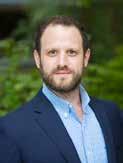
There’s also a tendency to place Israeli voters into a left-right di chotomy but the reality is much more complex. Because Netanyahu is fighting

Scheindlin, in a webinar hosted by several liberal American Jewish groups, said she anticipated that the next govern ment would initiate several new policies that won’t sit well with many in the Ameri can Jewish community. These include an over-ride law that would weak en the Israel Supreme Court, “regularize” the settlements in the West Bank, and erase fraud and breach of trust crimes from the country’s law books –thereby ridding Netanyahu of those charges.
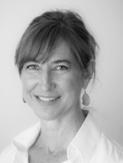
Noting the anxieties among the American Jewish community over the recent Israeli elections, and wanting his students studying Israeli politics to get an Israeli view point, Sperling has invited outgoing Diaspora Minister Nachman Shai – and one-time visiting professor at Emory University -- for a webinar on Nov. 17 at 10 a.m. [You can join the webinar with the Zoom registration link: https://zoom.us/webinar/register/ WN_lQhkQXX6Q02LgpY6e1qgYQ] ì

are at the beginning of the sausage being made,”
When Jeremy Lich tig joined the University of Georgia Hil lel as program director seven years ago, he wanted to find new ways to engage the Jew ish student body, which accounts for ap proximately three percent of the school’s entire undergrad population. With a focus on “interacting with the students where they’re at,” Lichtig, a graduate of SEC-rival Auburn University, reached out to the two Jewish fraternities, TEP (Tau Epsilon Phi) and AEPi (Alpha Epsilon Pi), both of which have superb academic reputations and account for a large por tion of the University of Georgia’s Jewish population, about ways to come together.
Lichtig wanted to broaden Hillel’s influence while helping the brothers pur sue their collective goal of being philan thropically influential organizations. After different ideas were bandied about,





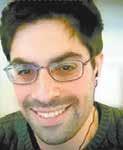
the two fraternal organizations and Lich tig decided to hold an annual basketball game pitting the two houses against one another in friendly competition, the pro ceeds of which would support a different charity every year.
Understandably, the game had hum ble beginnings. In 2017, the inaugural event was held at a tiny gym in down town Athens with one hundred or so in attendance. But over the next couple autumns, the charity hoops game grew more prominent, leading to incremen tally higher amounts raised for worthy causes. Until, of course, COVID descend ed upon humanity, rendering gymnasi ums depressingly empty for months on end. As such, for the past two Octobers, there was no Hillel UGA Charity Basket ball Game.
Yet thanks to the unswerving perse verance on behalf of Lichtig and UGA’s two Jewish fraternities, the Hillel UGA Charity Basketball Game resumed in ear nest this past month, this time benefit ting the SherryStrong Foundation whose mission is to educate women about the symptoms of ovarian cancer while also
Last month, UGA’s two Jewish fraternities, AEPi and TEP, came together in pursuit of two of their favorite activities -- philanthropy and basketball. // Savvy Photography
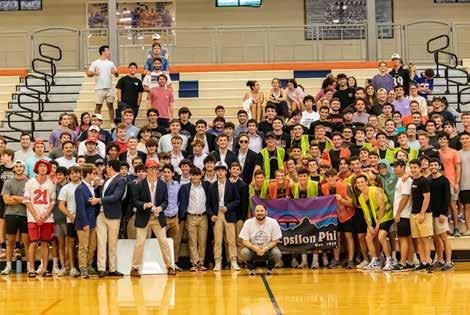
supporting those undergoing treatment. (Each year the two fraternities take turns selecting a charity to get behind and this year AEPi took the initiative to support SherryStrong.) On Sunday, October 16, over 250 fans filed into the Cedar Shoals High School in Athens to watch TEP take on AEPi. Ultimately, between pre-game fundraising efforts and ticket sales, over $5,000 was raised, marking the event’s most successful year ever.
“It was just a wonderful release for them to be able to play this, for them to be able to raise that amount of money, and it all coalesced into something beau tiful,” says Lichtig, who assumed his cur rent post as Hillel UGA campus director in July 2021 after previously serving as Hillel UGA assistant director. “They’ve been waiting two years to do this, so the crowd was way into it. The people that were helping, whether it be janitors, se curity, they were excited.”
Excitement permeated the UGA grounds in the days leading up to the game. Spearheaded by fraternity lead ers, Jacob Katz and Spencer Gordon (TEP) and Eric Becker (AEPi), the two houses not only fundraised impressive sums but also piqued the interest of the UGA Men’s Basketball team, including new head coach Mike White, who likely would have attended had it not been for a prior commitment, but looks forward to doing so next year. Meanwhile, the UGA Athlet ics Department has grown aware of the charity game, and while it wasn’t directly involved in this go-round, did express in terest in having greater involvement in the years ahead.
Lichtig believes the growing popu larity of the annual charity game speaks
to the fact that Hillel is gaining signifi cant traction on UGA’s sprawling cam pus, as evidenced by the new Hillel build ing that will be welcoming students next fall, standing three times as large as the current center, one that has been in exis tence since the 1950s.

“We try to be a smorgasbord of Juda ism for these students,” he adds. “With that, we have grown with the student population here, with the Jewish popu lation here, and that’s why we need this new building.
“With Greek life, it’s a wonderful friendship that they can have with each other. Most of these students came from Atlanta and most of these students know each other outside of Greek life, but it gives them a sense of community. We at Hillel see that as a Jewish community that we need to serve. Hillel is there to make college feel like home and to exten uate the opportunities that they have. We have this wonderful opportunity to show UGA that Jewish students are wanted here.”
The Hillel UGA Charity Basketball Game, played over two 20-minute halves, was a back-and-forth contest with AEPi ultimately prevailing 48-45 in what was perhaps some consolation after TEP won the weeklong fundraising challenge pre ceding the actual competition. Game out come aside, the joint fundraising efforts on behalf of both houses proved to be a smashing success and marked the con tinuation of a proud tradition of UGA’s Jewish Greek organizations—the soror ity STD is a powerhouse with its annual “Greek Grind” event—having a profound philanthropic impact on the Athens com munity. ì
When Bronxville, New York, native Harrison Bader got traded from the St. Louis Cardinals to the New York Yankees on August 2, he immediately returned to some of his favorite eateries: Caridad Express, a Dominican restaurant in the Bronx; Best Pizza on 1st; the local deli where in high school he would routinely grab a bacon, egg and cheese on a blue berry bagel in the morning. That’s right, blueberry. New Yorkers take their bagels seriously—after all, it’s a decades-old de bate across the five boroughs as to how the starchy breakfast item should be pre pared—so the new Yankee centerfielder’s rather unconventional sweet and salty preference raised a few eyebrows when it crept into the world of social media.



And last month, in the pressure crucible of October baseball, Bader, hav ing barely played for New York in the regular season thanks to a nagging right foot injury, started doing something else rather unexpected: hit home runs. Five of them, in fact, over the course of nine postseason games, making him only the fifth player in Yankee history with five or more long balls in a single postseason. With only 52 homers to his name enter ing the playoffs, a power surge from the kid who grew up eleven miles north of Yankee Stadium idolizing Derek Jeter came out of nowhere.
“Yeah, it [Bader’s impact] has been great,” said Yankees left-handed starter Nestor Cortes before Game 3 of the ALCS, a series his team ultimately lost to the eventual world champion Houston As tros in four games. “Obviously, we got him over here and he was hurt. We didn’t know what to expect from him. But he’s definitely turned it on. He’s definitely been somebody for us that’s been great in every situation of the playoffs so far. He’s a great clubhouse guy. He’s really good people. He cares about all the guys in there, and that’s what makes him great too.
“He adjusted to what we were do ing here, the philosophy we had, and he gelled right with us. So, for him to come out and do that with us and to perform how he’s been performing, it’s been great.”
Added Yankees manager Aaron Boone, “He’s had an outstanding postsea son. Hitting the ball out of the ballpark … I feel like he’s putting together a lot of big at-bats.”
Yankee fans across the Tri-State Region were initially underwhelmed with the August 2 swap that sent start
ing pitcher Jordan Montgomery to the St. Louis Cardinals for Bader, a 28 yearold centerfielder hobbling around in a walking boot. Said pessimism, however, quickly subsided on the evening of Oc tober 11 during New York’s ALDS opener against the Cleveland Guardians when Bader, who will be representing Israel in this spring’s World Baseball Classic by vir tue of his father, Louis, being a practicing Jew (a fascinating story in its own right as Bronxville used to have a reputation of not welcoming members of the Jewish community along with other minorities), cleared the fences in the bottom of the third inning. In doing so, he became the only Yankee to hit his first homer for the franchise in the postseason.
In attendance were over 100 friends and relatives including Louis, a retired tax attorney who spent so many summer evenings hitting grounders to his little boy on New York City’s rocky sandlot fields that Harrison (not to be confused with his grandfather “Harry”) ultimately gave up shortstop for center field. Which meant that years later, as a Yankee, he would patrol the same spot in Yankee Stadium that his father’s hero, Mickey Mantle, did 60 years ago.
“You know, I focus solely on the things I can control day in and day out,” said Bader, when asked how the child hood fantasy of starring for the Yanks compares to actually living it. “One of those things that is not in my control is how I’m moved as a piece especially at this level. I just view being traded here very serendipitously, and I just look to take advantage of it every single day.
“It’s definitely sweet, but, you know, again I’m here to play ball. I’m here to win. But to be able to do it in a Yankees uniform is definitely sweet, no doubt about it. That wouldn’t change regardless of the circumstances, regardless of the uniform.”
Bader’s colorful persona within the confines of the Yankee clubhouse—he sports vibrant graphic T-shirts and Ben & Jerry’s Chunky Dunky sneakers—be lies his often emotionless, business-like demeanor in public as evidenced by such comments. Undoubtedly, he comes across as a thoughtful, yet serious young man who, unlike some of his twentysomething contemporaries across Major League Baseball, has no use for histrion ics or showboating.
When asked during the ALCS if this has been a dream—slamming a tonesetting homer in Game 1 of the ALDS at Yankee Stadium, where he watched the 2009 Yankees capture the World Series,

enroute to carrying New York to the ALCS—Bader, ever-cognizant of staying in the moment, responded, that, quite simply, “It’s a dream to be in a big-league uniform. I’ve always wanted to win a World Series and we’re a series away from it. But just being in a big-league uni form has always been my dream.”
It would have been easy to get swept up in the moment this October. But clear ly, it wouldn’t have been conducive to posting a .333 average and 1.262 OPS to go along with the historic five homers.
“Remaining as emotionless as pos sible and just taking care of the baseball on all sides is my singular focus.”
Though the Yankees, of course, did not stay true to their singular focus— snapping their thirteen-year World Se ries drought—the offensive tear from Bader, a 2021 Gold Glove winner who has one year left on his current contract, bodes well for a now heavily-maligned franchise that may be losing its corner stone player in Aaron Judge to free agen cy this offseason. ì

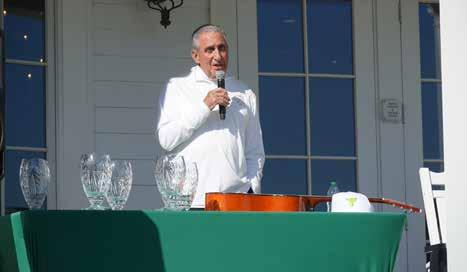 By David Ostrowsky
By David Ostrowsky
For those who struggle with stutter ing, still one of the world’s most stigma tized disorders, finding effective and af fordable therapy can be a struggle unto itself. From a financial perspective, stut tering is often not covered by third-party reimbursement plans, leading many with the condition to spend thousands of dollars on therapy that may, or may not, be appropriate for their needs. Indeed, those who suffer from stuttering often have to sift through substandard care options because precious few speech lan guage pathologists, even the most highly skilled ones, are well versed in the area.
So, to continue in their efforts to fill this gargantuan void, the Arthur M. Blank Center for Stuttering Education and Research (The Blank Center), backed by renowned Atlanta philanthropist and Falcons owner Arthur Blank, held its in augural celebrity golf tournament at the Atlanta Country Club on Monday, Octo ber 24. The jam-packed slate of events, which included putting contests, hole-inone competitions, and silent auctions, ul timately accounted for $325,000 in funds directly supporting stuttering education and research.
The tournament, which is primed to be a yearly event drawing in scores of lo cal athletic celebrities including former Braves and Falcons players, was largely the brainchild of Blank, Christiaan Be zuidenhout, a three-time European Golf Tour winner, and Dr. Courtney Byrd, who in 2020, as a distinguished professor at The University of Texas’ Moody Col lege of Communication, partnered with the Arthur M. Blank Family Foundation to form the aforementioned Arthur M. Blank Center for Stuttering Education
and Research, whose first satellite office was established in Atlanta in 2021.

As one of the approximately three million Americans affected by stutter ing, Arthur Blank has whole-heartedly invested himself toward alleviating the burdens experienced by others strug gling with the confounding speech dis order. Going forward, the newly estab lished golf tournament will undoubtedly augment his noble mission.
“Arthur is a brilliant person,” says Byrd in speaking to the Atlanta Jewish Times several days after the event. “His brain is as big as his heart and that’s really the truth. He’s invested in this obviously financially, but emotionally, personally, and provided us with opportunities that we never would have had if not for him. It’s been extraordinary. It’s not as if he has funded a grant and walked away. He’s funded a grant and he’s done everything that he can to help us exceed the goals of that grant. Any progress that we make we’re indebted to him. Every life that we change is reflective of him and his own journey and the fact that his own mom told him that what you have to say is im portant and don’t let stuttering stop you.
“It’s an inspiration to every person who goes through our treatment pro gram to know that he [Arthur Blank] is not just there in name. He’s physically present. He’s helping us to think through ways for us to reach more people across platforms that we just wouldn’t even be able to probably think about.”
The first-ever golf tournament, which not only showcased public fig ures but also those who have undergone treatment provided by The Blank Center, proved to be an effective mechanism for broadening the foundation’s reach. In particular, the inclusion of South Afri


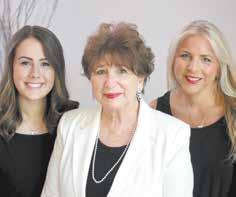
On October 24. Falcons owner Arthur
had one of his finest moments as a philanthropist as his foundation, The Arthur M. Blank Center for Stuttering Education and Research, launched its inaugural charity golf tournament. // Courtesy of Arthur M. Blank Family Foundation.
can pro golfer Christiaan Bezuidenhout represented a compelling way to human ize what can be a debilitating condition afflicting people worldwide of all socioeconomic classes, religions, races, ethnic backgrounds.
“What’s wonderful is when you hear Christiaan you hear his stuttering,” says Dr. Byrd, who had her first exposure to speech language pathology when she was an undergrad at Louisiana State Uni versity, during which she first recognized the inadequate services available to the stuttering community, and later initiated the stuttering education and research program at The University of Texas at Austin in 2003. “The vast majority of peo ple who are in the spotlight who stutter either hide their stuttering or they stutter at a low frequency, and so you don’t ever really see it. Christiaan now, as the face of our program, he stutters, and you hear it. He wants to make sure that we reach as many people as we can so that no child
must navigate their childhood and their early adulthood the way that he did.”
Byrd has designs on advancing un derstanding about the nature and proper treatment of stuttering through the ad vent of evidence-based programming to treat children, teenagers and adults worldwide. Over the next decade, behind the Blank Center’s support, Byrd looks forward to opening more satellite cen ters and launching her signature inten sive treatment program (‘Dream. Speak. Live’) across a host of new countries in cluding Nigeria, South Africa, Italy, Por tugal, Germany, Ireland, Belgium, The Netherlands, Malta, Pakistan, Norway, and Mexico. Another critical underlying goal of these efforts is to help people who don’t stutter better relate to and empa thize with those coping with these chal lenges.
“With Arthur’s vision and support, it’s definitely not limited by the United States,” says Byrd. ì



Vibrant community is closer than you think at Heartis Buckhead, where our Vibrant Life® program means there’s always fun to be had. Plus, our Elevate® dining options mean residents enjoy nutritious meals every day without sacrificing flavor.

Visit heartisbuckhead.com or call (404) 724-5528 to schedule a tour today!

Some weeks carry greater emo tional weight than others.
breezy, but a chill arrived as predicted and rain began at dusk.
Monday’s moment was an appoint ment with the surgeon who removed a can cerous tumor three years ago. That diagnosis prompted my August 2019 column titled “A Club No One Wants to Join.”
 Schechter From Where I Sit
Schechter From Where I Sit
For three years I have received “main tenance treatments,” punctuated by pro cedures to see how things are going. This was the first since the prescribed end of the treatments. The doctor recalled how ner vous I was at the first such examination. I sweat these tests. He asks, “How are you do ing?” and I reply with “You tell me.”
When told that everything looked good, I felt relieved more than anything else. Checks every six months now become the norm. There are no guarantees, but lon ger nothing is found, the better the odds “it” doesn’t return.
I am grateful for the doctor’s skills. I am grateful for the nurse who adminis tered most of my treatments. Her relentless optimism kept me from dwelling on poten tial setbacks. She recently took another job, so I texted her and received a celebratory emoji and an admonition to take care of myself.















Tuesday was election day, marking 50 years since I first reported election results on a high school radio station. Suffering from a nasty cold, I monitored the returns online and on television from my living room chair. I worked until 1 a.m. Wednes day, resumed at 8 a.m. and filed my story for the AJT.
I then turned my attention to the flight my wife and I were taking that night to her hometown, for the unveiling of my father-in-law’s gravestone. On the chance that my cold was COVID, I tested Tuesday night and again Wednesday; both negative.

I met my wife in a collection of cities that straddle the Illinois and Iowa sides of the Mississippi River. I was a newspaper reporter. She was organizing for a political campaign.

Before her two sisters and her brother, along with his trio of daughters, joined us on Thursday, we played tourists, particu larly enjoying the Figge Art Museum in Davenport, Iowa. The day began warm and
By Friday morning at the cemetery, the temperature had plummeted 40 de grees in two days and a northwest wind was blowing. The gray skies seemed appro priate. After a brief service, we placed rocks on my father-in-law’s grave and on those of his parents and an infant son. This is why we came, to perform this Jewish ritual, linking the generations.
That afternoon the city of Rock Is land, Illinois, hosted an unveiling of a dif ferent sort, a portrait of my father-in-law that will be displayed in city hall with those of other mayors. He resisted the honor in life (having served for several months following the death of his prede cessor), but it was an occasion appreciated by his children.
Friday night we attended a Veterans Day Shabbat service. This Jewish com munity has dwindled from some 2,000 in the early 1980s to 400 or so today. The Re form congregation in Davenport and the Conservative congregation in Rock Island, where my wife grew up, found themselves with buildings that had become too large. The solution was not to merge but to share — both a building and a rabbi.
Their new home in Davenport had been a real estate office and then a steak house. During renovations, painstaking efforts were taken to assure that each con gregation had an equal amount of display case and wall space for memorial boards, photographs, and other memorabilia. The ark doors are adorned with elements from both congregations. The usual schedule is a Reform service Friday night and a Conser vative service Shabbat morning.
The bimah was draped with red, white, and blue bunting. Blue or red kippahs were available. The U.S. national anthem was sung. Congregants called to recite prayers and offer readings cited their family’s vet erans, naming fathers and grandfathers, brothers and sisters, uncles and aunts, sons and daughters.
Saturday it was time to return home, my wife’s siblings to a Detroit suburb, to Coral Gables, Florida, and to the Texas hill country. As we parted, there were hugs and kisses and the Yiddish expression “for ge zunt un kum gezunt” (go in health and re turn in health), which my wife’s family has shortened to “forgie and kimmie.”
This was a week for memories, for honoring the past and cherishing life in the present, for laughs and tears, and espe cially for treasuring family. ì
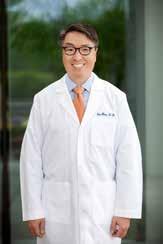
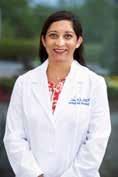
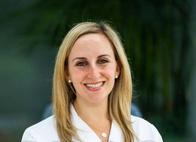
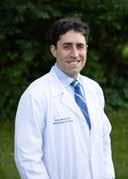
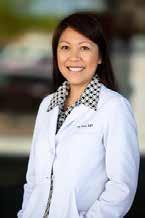

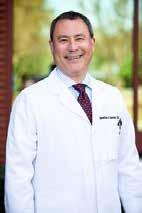

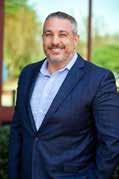
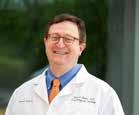

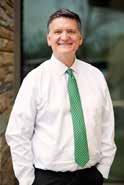
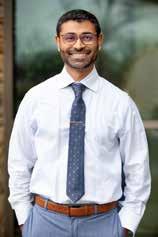








The holiday season ushers in feelings of joy and celebration, but many Americans can also experience physical, mental, and chemical stressors as they prepare for gath erings, make travel plans or shop for gifts. To help relieve this stress and tension, The Joint Chiropractic Midtown announced its “Back Friday” deal of two free clinic visits with the purchase of a 10-visit package. The offer is healthier holiday season.”
New Republic Partners announced the acquisition of Haber Investment Counsel, an Atlanta-based investment and multi-family office firm serving ul tra-high-net-worth families and individu als in the Southeast.

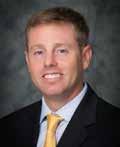
“We are looking forward to working with Cort Haber and his team to broaden our




specific fund offerings. Firm clients in vest alongside firm partners, large family offices and other clients while maintain ing confidentiality and a customized so lution.


“We are joining forces with New Republic Partners to add depth and broaden our scope in serving clients with

Elizabeth Langfelder has also joined the Atlanta Jewish Times as an account manager. Langfelder brings a wealth of experience in sales, marketing, management, and cus tomer relations. She is a long-time member of National Council of Jewish Women. She sat on the board for almost ten years with NCJW and developed an e-commerce sell ing platform to resell donated items, which generated additional operating funds for this non-profit organization in Atlanta.
Most of Langfelder’s career experience has been in hospitality management and wholesale food sales. Not-to-mention cus tomer development and care. She enjoys tak ing care of high-profile customers with the most challenging demands. Her success was measured by the number of repeat custom ers and the longstanding partnerships that she developed. There is no challenge that she was unable to achieve. She is motivated by learning more about each of her customers’ needs and formulating a plan of action to ac complish the goals they set together.
Langfelder has lived most of her life in Sandy Springs where she raised her two children and is a member of Temple Sinai. She watched the growth of this Atlanta sub urb become the dynamic city that it is now. She is a regular visitor of the Sandy Springs Farmers Market, which her late husband, Jeff Langfelder co-founded in 2010. Her family continues to stay involved in Jewish Atlanta’s philanthropic causes. February is her favor ite month as she attends as many of the At lanta Jewish Film Festival films as possible.
For fun, she enjoys cooking, especially Italian food. Making homemade pasta, where regional Italian dishes have become a specialty. Food and wine tours are on always her schedule. Langfelder’s most recent posi tion with Farmers and Fishermen Purveyors further developed her customer service and sales skills which she will bring with her to the Atlanta Jewish Times team.
"I'm excited to join this vibrant team at the AJT."
Ilyssa Klein has joined the Atlanta Jew ish Times as an account manager. Klein brings a wealth of experience in sales, mar keting, management, and customer rela tions.
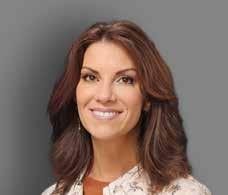
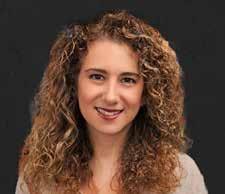
A native of Long Island, N.Y., Klein moved to Atlanta after her parents pur chased The Bagel Palace. Ilyssa regularly worked at the family restaurant and became a favorite of many patrons, earning herself the nickname, “The Bagel Princess.”
With a background in advertising, mar keting and sales, Ilyssa has previously served as center director of Kaplan Test Prep, where she was responsible for product sales growth, managing various departments, educating, and training staff as well as the community, on Kaplan products.
Klein also coordinated with area schools and student organizations, including leading presentations of programs offered by Kaplan. Some of her other duties included managing the office budget and tracking sales growth.
“As a longtime member of the Atlanta Jewish community and reader of the AJT, I am excited to be joining the AJT team and contributing to an important outlet and voice in our community. I look forward to sharing my expertise in customer relations, sales, and marketing with the AJT.”
Ilyssa, and her husband, Chad, have two children: Emme, 10, and Jesse, 12. Emme at tends Sarah Smith Elementary School and Jesse is a student at Sutton Middle School. Jesse is set to have his bar mitzvah in March at The Temple, where Ilyssa and her family are members.
She was a senior in high school when her family made the move to Atlanta, where she graduated from Walton High School and continued her education at Clark University in Massachusetts.

“I am just so thrilled to be working with this amazing team and community”.
Compiled by AJT Staff
Piedmont Heart Insti tute’s 166 peer cardiologists awarded Dr. Steve Sigman Physician of the Year at their Septem ber annual retreat at the Whitley Hotel. The award rec ognizes one Piedmont Heart physician who best represents Piedmont’s vision and culture. Sigman best summarized his own philosophy to the AJT, “Make an accurate diagnosis, formulate a plan, and execute the plan in a timely fashion.” Sig man is known for his modesty, patientcentered approach, and kind bedside manner.
Marcia Caller Jaffe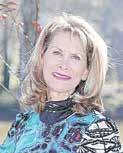
Dr. Sigman is board certified in both cardiovascular diseases and nuclear car diology. He currently serves as the direc tor of Nuclear Cardiology for Piedmont Atlanta Hospital and the Piedmont Heart Institute. He also serves as a cardiol ogy consultant both in the office and at Piedmont Atlanta. His interests include diagnosis and management of coronary artery disease, valvular heart disease, vascular disease, and cardiac manifes tations of complex medical conditions. Dr. Sigman is a Fellow of the American College of Cardiology and the American Society of Nuclear Cardiology. He has authored and co-authored several publi cations and abstracts, and he frequently lectures on the topic of cardiac imaging.
Some peer tributes were Charles L. Brown III, M.D., CEO of Piedmont’s Phy sician Enterprise, and a practicing inter ventional cardiologist. “The positive dif ference he’s [Sigman] made in the lives of the patients he cares for is clear in the remarkable feedback received from his many patients and his peers. His efforts to help each patient’s specific needs often go above and beyond his usual duties as a cardiologist, making him very deserving of this recognition,” Dr. David Kandzari said. “Dr. Sigman is known for treating those impossibly complicated, yet cur able, diseases. He spends time with the patients and listens to figure out an ap propriate diagnosis and is someone you want helping you out. He loves his work and always brings so much joy to the unit.”
Dr. Sigman was a pioneer in using amyloid PYP scans to determine if a pa
tient has cardiac amyloidosis, how severe it is and what treatment options are best. He also started the cardiac positron emis sion tomography (PET) scan program at Piedmont Atlanta, which is a cardiac scan that can detect whether areas of the person’s heart muscle are receiving enough blood, if there is heart damage or scar tissue in the heart, or if there is a buildup of abnormal substances in the heart muscle. These pictures help cardi ologists identify disease or poor blood flow in the heart and more accurately diagnosis cardiac issues.
A native of Toledo, Ohio, Sigman re ceived his medical degree from the Medi cal College of Ohio, and subsequently completed a medical residency and car diology fellowships at Thomas Jefferson
University Hospital, Philadelphia, and Emory respectively. Following that he served as chief resident at Grady Memo rial Hospital, and prior to joining Pied mont Heart Institute, was assistant pro fessor of medicine (cardiology) at Emory University. He moved to Atlanta in 1994 and joined Piedmont Heart Institute in 2009. Steve and wife Carolyn, also a phy sician at Piedmont (Brookhaven Internal medicine), have five children from the ages of 21 to 28. Members of Congrega tion Shearith Israel and serving on their board, Sigman described his busy fam ily life, “All five of my kids were very in volved at the Marcus Jewish Community Center from their early preschool years to high school, including summer camp, sports, and all kinds of things. I common

ly had Sundays where I had five sporting events occurring on the same day [most at the same time] at the Marcus JCC!”
Piedmont Heart Institute ranks in the top 5 percent in the country among cardiovascular organizations. Local phi lanthropist Bernie Marcus, through The Marcus Foundation, is a major donor of Piedmont Healthcare and Piedmont Heart. He was also a patient and received care from the Marcus Heart Valve Center that his foundation established at Pied mont. The foundation gifted Piedmont $75 million in 2016, then six years later in 2018 The Marcus Foundation gave an ad ditional $20 million to establish the Mar cus Heart Valve Center. Bernie Marcus was a recipient of the world-class cardio vascular care he helped to develop. ì

Atlanta is chock full of interesting movers and shakers, some bent on creativity, living the good life, and in this case, devoting decades to helping others. Lean in to hear some of the “off the cuff” remarks as to what makes cardiologist, Dr. Steve Sigman, tick.
A native of Toledo, Ohio, cardiologist Dr. Steve Sigman was recently recognized by his peers at Pied mont Heart Institute as Physician of the Year for his patient focus, ability to tackle complicated cases, lis tening skills, and expertise in multiple fields, including his research on cardiac imaging. Sigman received his medical degree from the Medical College of Ohio (now called the University of Toledo Medical Center) and completed his training at Thomas Jefferson University Hospital (Philadelphia) and Emory University, respectively. He moved to Atlanta in 1994 and joined Piedmont Heart Institute in 2009.
Prior to joining Piedmont, he served as chief resident at Grady Memorial Hospital and was assistant professor of medicine/cardiology at Emory University. His spouse, Carolyn, is an internal medicine doctor at Piedmont Physicians of Brookhaven. The Sigmans belong to Congregation Shearith Israel and have five children.
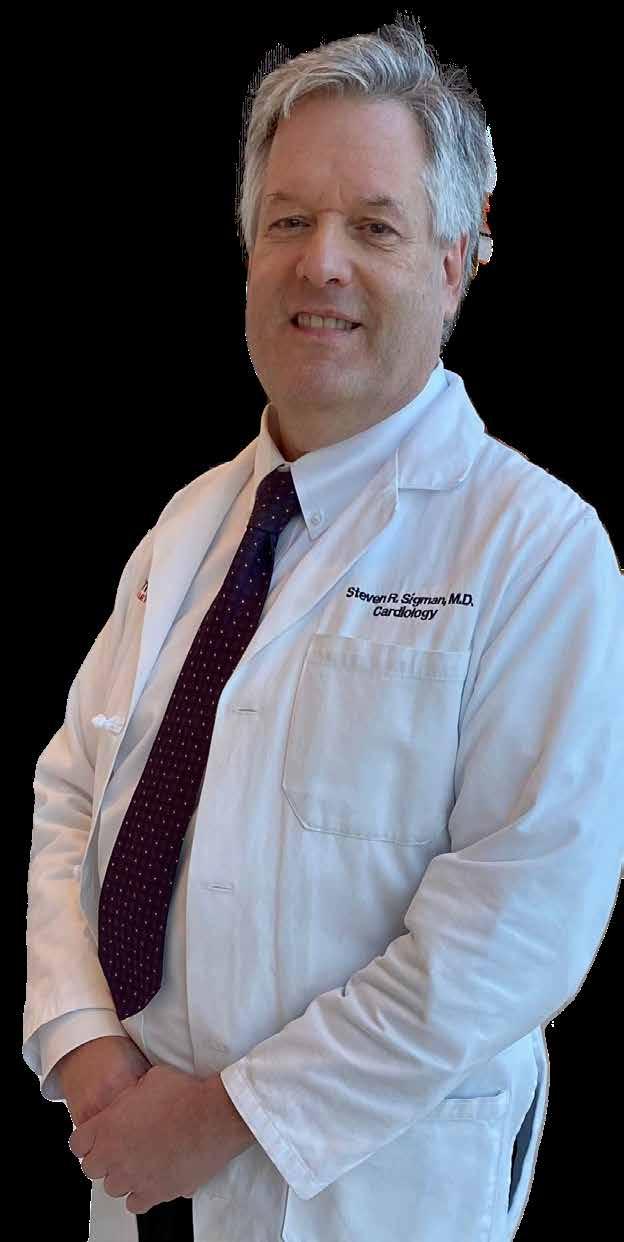
Look for Sigman on hiking trails scouting for red cockaded woodpeckers.
If I had not become a physician I would have been: An advertising account manager.
I am currently reading: “Starry Messenger” by Neil deGrasse Tyson. I also like historical fiction and Jewish history of the Middle Ages.
Most exotic vacation: Kyoto, Japan
My children would say about me: Groan…. another dad joke!
Guilty pleasure: A really good hot dog with mustard and sauerkraut
Best advice your father gave you: Hard work and a little courage go a long way.
Being married to a physician means: Having a lot to share
One fun thing folks don’t know about me: I like birding.
I like most about living in Atlanta: Lots of nature trails inside the perimeter.
Health advice for 2023: Oatmeal, Georgia peanuts, strawberries and blueber ries, sunflower oil
Five children! How are they turning out?
Sigman: Ages 21, 23, 25, 26, and 28. Two are still in college, one in medical school at Augusta, one is a recent graduate in psychology, and one studying to be an electrician. So yes, all doing well.
Reported by Marcia Caller JaffeExperts have reported that COVID-19 is on the de cline in Georgia. According to the Georgia Department of Public Health, Dr. Cherie Drenzek, epidemiologist, re ported in mid-October that: COVID since mid-August is down 80 percent; hospitalizations are down 89 percent; deaths in Georgia are approximately 100 per week; and 23 percent of the cases are one of the three new variants.
Local infectious disease physician Dr. Mitchell Blass weighed in with his perspective looking back on this phenomenon. Provided by Emory Saint Joseph’s Hospital, or St. Joe’s, Blass reported that there were 5,220 COVID patients treated “in patient” at St. Joe’s from March through Oct. 17.
On other parts of the virus’s mystery, Blass re marked, “Unanswered questions remain like the impact on immunity derived from previous infection with the original or new variants of COVID. We simply do not know.”
Blass noted that Fulton, DeKalb, Gwinnett, Cobb, Forsyth, and Clayton counties all are labeled “low” for infection rates. When queried about his own experi ences treating COVID, Blass said, “The one thing I really wish we [physicians] could understand more clearly is why some people have a mild, often asymptomatic, course of illness and other individuals may experience a significantly more profound illness, which, on occa sion, requires hospitalization. I don’t have a test, a tool,
or a metric, apart from an individual patient’s previous medical history, that can be used to predict a specific pa tient’s risk of hospitalization or mortality from COVID.”
Some doctors have expressed caution regarding winter months potentially bringing on another surge with most people spending more time indoors due to the colder weather; or new strains coming from Europe and Asia.
Blass commented, “I have learned not to make pre dictions regarding an unpredictable matter. I cannot imagine that the large population that has either had the


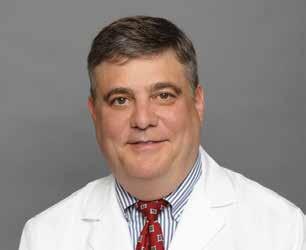
vaccination, with or without a booster, combined with the substantial population of the United States who has, at one time since 2020, had COVID (either with or with out symptoms), will make it substantially unlikely that we will not see another winter such as we did in 2021.”
There is also swirling commentary about those with lingering long-term effects of COVID. He said, “At the present time, there is no consensus regarding a firm medical definition of what long COVID refers to, nor have studies definitively proven COVID to be the cause of what is termed ‘long COVID’ by many. Because this remains a relatively novel infection, and only a little un der three years has passed since the first case of COVID was identified in the United States, I anticipate it will be several more years before health care providers have a clearer understanding of the long-term or lingering symptoms patients may attribute to COVID-19.”
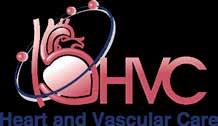
Provoking more thought, Blass pondered, “The term ‘Muller’s Ratchet,’ attributed to Herman Joseph Muller, may provide us with some insight. It is a phenomenon, not unlike what we are experiencing now with the Omi cron variant of SAR-CoV-2. Essentially, Muller’s Ratchet explains the process through which an epidemic infec tion evolves over time. As mutations occur over time, the transmissible agent (virus or otherwise), becomes more contagious while at the same time, less virulent. Thus, infecting more individuals, yet causing less illness and leading to the eventual end of the epidemic.” ì
Timeline of COVID-19 transmission in the U.S.
* Jan. 9, 2020 – World Health Organization (WHO) announces a mysterious Coronavirus-related pneumonia in Wuhan, China

* Jan. 20, 2020 – Screening begins at three U.S. airports in New York, Los Angeles, San Francisco
* Jan. 21, 2020 – First case of confirmed in Washington state; person-to-person transmission confirmed
* Jan. 31, 2020 – WHO issues a global health emergency
* Feb. 2, 2020 – Global air travel is restricted
* Feb. 3, 2020 – U.S. declares a public health emergency
* March 2, 2020 – First case of SARS-CoV-2 in Georgia
* Dec. 11, 2020 – First COVID-19 vaccination available

Northside Hospital, which had purchased her practice a few years earlier.
When asked about the price discrep ancy, Lee Echols, senior vice president of marketing and communications at North side said, “Today’s healthcare environment is complicated, but Northside and many other healthcare systems have several tools in place to help patients navigate both care and the cost of care.”
Debbie DiamondWhen it comes to health care, hospitals, and health insurance for 2023, the old buyers’ adage should apply, except in this case it would read, “Patients Beware.” Health insurance costs continue to rise with $5,000-plus deductibles per person and $2,000 premiums each month for many families. Add in healthcare costs for co-pay ments, medicine, supplies, procedures and co-insurance, and the expenses become even more costly.
Health insurance companies point to the increased cost as a result of the surge in hospitals buying up medical practices throughout Atlanta. Accord ing to AHIP, a national advo cacy group for health insur ance providers and formerly known as America’s Health Insurance Plans, “As hospitals gain more market power by snapping up doctor practices, they can control referrals and demand higher prices, which, in turn, makes premiums and costs for everyone higher.”
Independent medical practices and freestanding medical facili ties, which typically offer much lower pric ing, find it harder to compete with the large hospitals and healthcare systems. Some physicians report taking early retirement or selling their practices to the large healthcare systems as a result.
Hospital executives blame the increased patient costs on higher deductibles for pa tients imposed by insurance companies, as well as the increased profits they believe health insurance companies are making. Caught in the middle are patients trying to find quality healthcare at an affordable price.
Case in point: Northside Hospital charged $8,240 for a Prolia injection to treat a patient’s osteoporosis. The United Health care negotiated rate allowed $3,951 to be charged. A year earlier, the charge from Para gon Infusion Center, an independent facility, was $4,573.40, or almost half the price for the same injection. That year, the Blue Cross and Blue Shield of Georgia negotiated rate was $1,357.04. From one year to the next, the cost to the patient increased by almost $2,600 because of different insurance policies and moving from an independent infusion cen ter to the outpatient area at a hospital. Para gon was not in the United network of provid ers, and the physician directed the patient to
While not specifically addressing the cost involved with the hospital, Echols rec ommended contacting a hospital’s billing customer service team to request costs be fore scheduling hospital procedures. He also recommended visiting www.northside. com/patients-visitors/billing-and-insurance/ price-estimates to find estimated costs or www.northside.com/patients-visitors/bill ing-and-insurance for more billing informa tion. In the case of the Prolia injection, the team scheduling the injection was unable to provide the an ticipated cost in advance and did not refer the patient to the billing department, though they did indicate that her in surance had approved the in jection.
The Affordable Care Act (ACA) Marketplace for health insurance opened earlier this month on Nov. 1, and health care experts stress that educa tion is a must as consumers make decisions about their insurance coverage and health care for 2023. Whether working with an in dependent insurance broker or on their own by visiting www.healthcare.gov, buyers will find more plan options this year than in the past.
What many consumers do not know is that they may qualify for a government tax credit or subsidy, thanks to the American Rescue Plan Act, passed in March 2021. This bill expanded funding so that more con sumers will qualify for the credit and lower monthly premiums. In addition, more people have been able to secure a cost sharing reduc tion (CSR), which lowers the amount paid for deductibles, co-payments, and co-insurance. To be considered for a CSR, individuals and families must enroll in a silver tier health plan. While the monthly premiums are typi cally more expensive, the overall savings at the end of the year can be considerable.
Tom Boyd, an independent insurance broker with Bogrow Insurance Group, has directed many of his clients to silver plans so they may take advantage of the tax credit and CSR benefits.
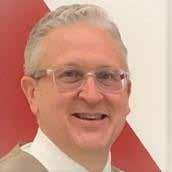
Julie Joffre Benveniste, owner of The Benveniste Insurance Group, indicated that some buyers may wish to consider higher
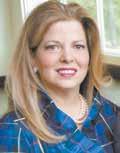
premium policies with lower deductibles if they have any ongoing health conditions. She recommended looking at all costs associ ated with the health plans, not just the cost of the monthly premiums.
“The cost of visits to the PCP (primary care physician) and specialists, medicine and in-patient hospital coverage are among the factors that should impact a consumer’s selection when reviewing plans,” she emphasized.
To review a variety of policies and to see if one qualifies for a tax credit, she pointed to www.healthsherpa. com. “Many people do not realize they may qualify for a tax credit, often saving them hundreds of dollars or more. For example, a family of four with an income of $150,000 qualified for a tax credit of more than $300 each month when they applied for health insurance in 2022,” Joffre Benveniste added.
Boyd also mentioned the savings of fered as a result of the American Rescue Plan Act and shared an example of a couple who had a combined joint income of $260,000 and qualified for a federal tax subsidy. He credited the relief bill with making insurance affordable for many more consumers and for the entry of several additional insurance companies back into the Georgia market.
Both Bogrow and Joffre Benveniste see health insurance as asset protection. “Just like car insurance, health insurance is for that G-d forbid moment when you want to be covered,” said Joffre Benveniste. To that end, indemnity plans sold by companies such as Manhattan Life can supplement a health insurance policy by providing actual funds to individuals when they are hospitalized, require outpatient services, or receive cancer care. Indemnity plans are not available on the government exchange but may be pur chased through independent agents.
An alternative to purchasing a tradi tional health insurance plan is participat ing in a healthcare sharing ministry. While
similar to a traditional plan, there are distinc tions. Healthcare costs are shared among members with common ethical or religious beliefs. United Refuah HealthShare is a Jew ish network, though many other health shar ing ministries are not restrictive and simply require belief in a higher power. Monthly premiums, called “monthly share amounts” in industry parlance, tend to be less ex pensive and claims or “share requests” are handled by pa tients submitting bills to the ministry directly unless physi cian offices agree to manage administrative process.
Insurance experts rec ommend several steps to en sure individuals select the best plans for their needs. First, consumers should contact their current phy sicians and hospitals to be certain they are on the plans considered. They should keep in mind that the insurance directories listing physicians are not always current. In addi tion, buyers need to check that prescriptions are on the health plan’s formulary or ask if there are alternative choices. Otherwise, they may pay the full price of the prescriptions.
Consumers may buy individual and family plans through Jan. 15, 2023, on the ACA marketplace and through insurance brokers. For a Jan. 1, 2023, start date, policies must be purchased by Dec. 15, 2022. Otherwise, a per son’s existing 2022 policy will roll over into 2023. Policies bought between Dec. 15, 2022, and Jan. 15, 2023, will start on Feb. 1, 2023.

Healthcare industry insiders acknowl edge seeking care and coverage has become more complex, difficult to navigate and ex pensive. Conducting independent research, contacting an insurance broker for guid ance, and speaking with administrators at physician offices may be the best path to help ensure buyers find the most appropriate healthcare coverage for 2023.
Julie Joffre Benveniste may be reached at julieb@gahealthbrokers.com or (404) 3167514. Tom Boyd may be reached at (678) 404BOYD (2693). ì
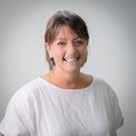

When Or acle Corpora tion, one of the world’s larg est computer software, com panies closed its buy of the Cerner Corpo ration for $28.3 billion earlier this year, it was the largest deal yet in the race to digitize the world’s health care re cords.

It was also three times more than Oracle had ever paid for another compa ny. Industry observers saw it as an indi cation of how serious Oracle, a database software and cloud systems provider, are in becoming a major provider of data for payers and suppliers of healthcare ser vices. The move opens a new line of busi ness for Oracle, which in recent years was seen as lagging in migrating its business to cloud based applications.

Oracle’s CEO, Safra Catz, character ized the buy as an important way that Oracle will expand into healthcare, which
she characterized as the “largest and most important vertical market in the world — $3.8 trillion last year in the United States alone.”
Her boss, Oracle founder Larry Elli son, who is the company’s chairman and chief technology officer saw the marriage of Cerner’s digital record keeping tools with Oracle’s development of a hands-free voice interface and secure cloud software to boost efficiency for overworked medi cal staff.
The company pointed to a study in 2019 by the Mayo Clinic that found that




doctors spent an hour on updating medi cal records for every hour they spent in caring for a patient. Mayo surveyed over 30,000 physicians from a cross section of specialties who gave a grade of F for the usability of currently available electronic health record systems. Moreover, the failure of health record keeping aids was considered a strong contributor to a phy sician’s psychological and professional burnout.
And it is not just individual physi cians that are affected by their attempts to work with the complex systems that are a part of the modern American health care environment. Last year the CEO and Chairman of Emory Healthcare, Dr. Jona than Lewin, whose 11 hospitals and 250 lo cations in metro Atlanta created revenues that topped $3.5 billion, stepped down last year after six years on the job. A decision that certainly was hastened by the pres sures of Emory taking a leading role in battling the pandemic.
privacy and outcomes, and lower overall healthcare costs.”



The move had the full support of Cerner’s president and chief executive officer, David Feinberg, who took his job only a year before, and will stay with the merged company.
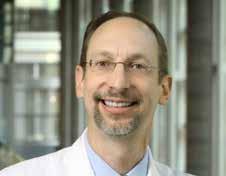
“Joining Oracle as a dedicated In dustry Business Unit provides an un precedented opportunity to accelerate our work modernizing electronic health records, improving the caregiver experi ence, and enabling more connected, highquality and efficient patient care. “
In June, Ellison said during a press briefing, that the goal of the company was to create a national health cloud-based data bank that pulls information from thousands of hospitals and medical cen ters. In many cases these medical records are only resident at those individual facili ties.
T h e B e r m a n C e n t e r i s a l o c a l , C A R F a c c r e d i t e d , h a n d s o n A t l a n t a t r e a t m e n t c e n t e r O u r h i g h l y s k i l l e d t h e r a p i s t s c o c r e a t e a u n i q u e r e c o v e r y p r o g r a m w i t h y o u t h a t s u p p o r t s w h o y o u a r e , w h a t y o u n e e d , a n d w h a t y o u w a n t f o r y o u r l i f e
g r a m 5 D a y ( 1 8 + ) : T h e P a r t i a l H o s p i t a l i z a t i o n P r o g r a m i s a n i n d i v i d u a l i z e d , e v i d e n c e d b a s e d r e c o v e r y p l a n t o t r a n s i t i o n c l i e n t s ( 1 8 + ) i n t o a h e a l t h y , s e l f s u f f i c i e n t l i f e w i t h l a s t i n g s u p p o r t a n d e n g a g e m e n t

E v o l v e f o r A d o l e s c e n t s ( 1 4 1 8 ) : M e n t a l H e a l t h ( p r i m a r y ) S u b s t a n c e U s e , T e c h n o l o g y D e p e n d e n c e , T r a u m a T r a c k s

C l i e n t s w i t h T R I C A R E c a n n o w u t i l i z e t h e i r o u t o f n e t w o r k b e n e f i t s f o r I O P & P H P g r o u p s e r v i c e s
Part of the challenge was in working to bring together not only with Emory network of facilities but in aiding other major healthcare systems, such as those at WellStar, Piedmont, Grady, and Chil dren’s Healthcare of Atlanta. All of which have their own electronic systems.

Dr. Lewin said he was returning to his “roots” — presumably a quieter life in education and the development of medi cal technology at Emory. He told CNN that it was not a sudden decision. He said he wanted, like Baltimore Orioles Hall of Fame player Cal Ripken Jr, “to go out at the top of your game.’’
“I’m looking forward to visiting my adult kids and spending [more] time with my wife,” Lewin said.





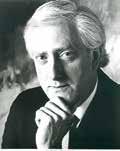
Oracle’s Ellison probably had health care professionals like Lewin in mind when he commented on the Cerner buy.
“This new generation of medical in formation systems promises to lower the administrative workload burdening our medical professionals, improve patient



He pointed out that makes it difficult for the information to be shared and for research teams to do large scale studies and cuts into the efficiencies of an already highly inefficient system. It’s said that for decades experts in healthcare technology systems and the federal government have worked to make the sharing of health re cords at separate institutions easier.
Only in 2020 was the National Insti tutes of Health able to create a centralized record database and then only for one purpose, for COVID-19 research. But that was accomplished only because the data collected was anonymous, didn’t require patient consent and was done through a concerted, ambitious effort by a team that had worked for years on the communica tion issues that had bedeviled previous at tempts.
Although all three of the executives involved in this attempt to create medical technology history come from different educational and social backgrounds, what united all three Ellison, Catz and Feinberg was their Jewish heritage, most noticeably for Catz, who was born in Israel. ì
 By Bob Bahr
By Bob Bahr
Earlier this year, a 57-year-old patient in Maryland became the first human to suc cessfully undergo the transplant of a geneti cally modified pig’s heart. The patient sur vived for two months but ultimately died of heart failure. There was some evidence that, while the procedure was considered suc cessful, the organ may have been contami nated with a pig virus, which could have led to the patient’s early death.
Otherwise, according to research that was presented online earlier this month at the American Heart Association’s Scientific Sessions there was considerable evidence that the transplanted animal heart beat more like a human heart than doctors had expect ed. In fact, according to the electrical signals that were recorded of the new heart, it more closely resembled a human heart and, in some measurements, outperformed it.
One of the study’s researchers, Timm Michael Dickfeld, an electrophysiologist at the the University of Maryland School of medicine, said the easy adaptation of the animal heart to its new human environ ment was a surprise.
“It’s truly a novel finding,” Dickfeld said, “that electrocardiogram (EKG) mea surements recording the heart’s electrical signal were so different from a typical pig heart’s reading.”
In other encouraging developments, in June and early July, a surgical team at New York University School of Medicine suc cessfully transplanted a pair of pig’s hearts that had been genetically modified to make them more compatible with the human chest cavity. They replaced the heart of two patients declared brain dead but who were being kept alive using ventilators. The or gans were monitored for three days, worked well and weren’t rejected by the patients.

“It was one of the most incredible things to see a pig heart pounding away and beating inside of the chest of a human be ing,” NYU transplant surgeon Robert Mont gomery told reporters.
The procedures, using the healthy liv ing organs from pigs to replace the diseased organs in human, is called by scientists, xenotransplantation. It was encouraging news for an estimated 100,000 people wait ing for a surgical transplant. Last year a re cord number of human organ transplants were performed.
However, every day 17 people die wait ing for new organs because they are in short supply. Of the more than 41,000 transplant procedures only about 3,500 were done of the heart, according to Alex Reyentovick, a cardiologist at New York University. He
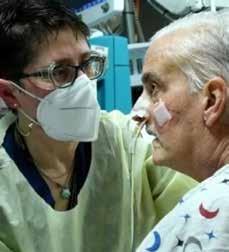
pointed out that they have a tremendous deficiency in organs, and many people die waiting for a heart, “Xenotransplantation really has the ca pability of addressing some of those supply limitations,” Reyentovick said, “and saving innumerable lives.”
While Jewish law forbids the consump tion of meat and other products derived from pigs, the animal has proven to be an important source of organs for transplan tation. Pigs are easy to breed, and they re semble in many aspects, the anatomy and physiology of human beings.
They can be raised in large number in conditions which are free of germs and viruses and can be genetically modified to minimize their rejection by the human body. In the case of the patient who sur vived for two months with a new pig’s heart the organ had been genetically changed to remove a specific sugar from its cells which was thought to have complicated previous experiments.
According to instructions in the Book of Leviticus, pigs are not considered kosher because the animals have hooves which are not split and does not chew its cud, like cows. The holy commandment in chapter 11, verses 7 and 8 prohibits the eating of pork and even touching the carcass of the animal.
A 1962 Israeli law generally does not allow pigs to be grown in Israel, although in certain areas of the country with numer ous Christians, pigs are allowed to be raised. Pork products also are sold in many Israeli markets.
Yet, while eating pork is not allowed, there is no prohibition in Judaism against the use of pigs to save lives. Heart valves from pigs are regularly used to replace de fective human ones, insulin for the treat ment of diabetes can be derived from pigs and pigskin has been transplanted to treat
severe burns.
Yet in Judaism, as well as Islam, pigs are disdained and in our industrial farm's pigs are bred in conditions that have been severely criticized by advocates for the ethi cal treatment of animals.
According to Lisa Moses, a bioethicist and veterinarian at Harvard Medical School,

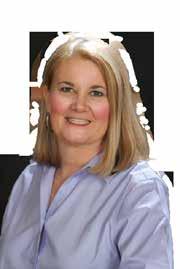

our treatment of the animals in view of their potential benefit to us, doesn’t make sense.
“We treat pigs in ways that we would never treat people, but we also recognize they’re so similar to us that they’re our bio logical models. You can’t make sense of that because it doesn’t make sense. It’s one giant paradox.” ì
 Jan Jaben-Eilon
Jan Jaben-Eilon
Baby boomers, those born between 1946 and 1964, or about 21 per cent of the U.S. population, are getting older. Some are still children to ag ing parents.
As they age, the risks of developing dementia, which includes Alzheimer’s disease, doubles about every five years. According to the Alzheimer’s Association, one in six people over 80 have dementia. For every person diagnosed with dementia, multiple family members are impacted.
This is not a disease that individuals, families, or society can ignore.
“It’s a physical disease that presents psychologically and mentally,” said Mary Caldwell, director of a new innovative adult center called Town Square which just opened in Sandy Springs and that fo cuses on dementia and Alzheimer’s.
“Dementia is a broad umbrella term that encompasses changes in thinking and behavior that people notice,” said Caldwell, who formerly worked at the Alzheimer’s Association. She noted that Alzheimer’s is the most common form of dementia.
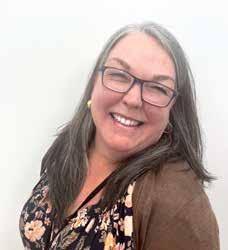
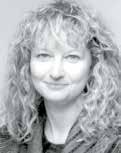
Town Square is a 12,000-square-foot facility that resembles a mid-20th-centu ry American town. It features 13 separate activity rooms that represent popular storefronts that existed during that era. The storefronts include a 1950s diner, aptly named Rosie’s, and fittingly displays several Coca-Cola signs, with Atlanta be ing home to The Coca-Cola Company, and Town Square sitting across the street from a Coca-Cola bottling facility.

Other storefronts include Starlite Theater with photos of Audrey Hepburn, Judy Garland, John Wayne, Marilyn Mon roe, and others adorning the walls. There’s a music room called “Spinners” to engage members with nostalgic tunes, a health club featuring themed exercise classes, Ronnie’s Garage with a standout vintage bright red 1964 Ford Thunderbird, as well as a library, working hair and nail salon, craft room and recreation room that in cludes a pool table and board games. It is open from 8 a.m. to 5 p.m., Mondays through Fridays.
“I dreamed of a resource like this when I was at the Alzheimer’s Associa tion,” said Caldwell.
According to Atlanta native Sarah Stennett, one of the franchise owners,

along with her husband Kellen, also an At lanta native, and her in-laws, Town Square is the first in Georgia to be grounded in reminiscence therapy, which is designed specifically to help individuals diagnosed with Alzheimer’s or dementia. The center leverages therapeutic reminiscing tech niques and other interventions to spark memories and stimulate the mind.
“There’s a massive need of this ser vice,” she said, noting that both her pa ternal grandmothers died of Alzheimer’s as well as both of her husband’s grandfa thers. “This is why I was attracted to this concept.”
Reminiscence therapy reportedly has been shown to improve mood, communi cation and sleep quality as well as reduce anxiety, depression, and agitation in those with dementia. While there is no cure and no means to prevent dementia, reminis cent therapy “can potentially delay the progression and need for long-term care. It can prolong their happiness and self-
esteem.”
“We are not an adult day care center,” emphasized Stennett, who also co-owns several Club Pilate studios in Atlanta. “We have elevated the dignity of adult day space. We engage them in multi-faceted exercises, yet there are many areas where they can chill and be alone. But it is mixed with socialization, which is a critical piece.”
Both Stennett and Caldwell under scored their idea for Town Square to be a community resource for people with de mentia as well as their caregivers, which Town Square refers to as care partners.
“We want to be an educational re source for the community,” said Caldwell, a former member of Temple Sinai when she lived in Atlanta, and Temple Rodeph Sholom when she lived in Rome, Ga. “We want the community involved.”
When someone is diagnosed with dementia, their lives become smaller and more isolated, she said. “There’s a stigma
“We want to be an educational resource for the community,” said
with Alzheimer’s and dementia, so when people need it most, they often lose their support system. It’s devastating and terri fying. People spiral into depression.”
Although Caldwell said that Jews aren’t at more risk for dementia, women, in general, are two-thirds more likely to develop Alzheimer’s. She added that “when a person becomes a care partner of someone with Alzheimer’s, their own risk increases six times due to the chronic stressors that affects all care partners.”
Starting the end of November, Town Square will offer an eight-week program on Alzheimer’s for care partners that will be free and open to the public. The facility will also be available for rent on evenings and weekends for special events includ ing corporate meetings, birthday and an niversary parties and group visits from senior living facilities.
Town Square is already receiving re ferrals from Emory University’s Goizueta Alzheimer’s Disease Research Center. ì
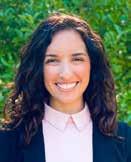






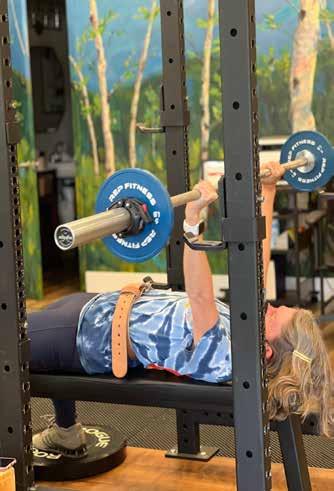
Determined volunteer Gail Solomon is not talking about pints of beer.
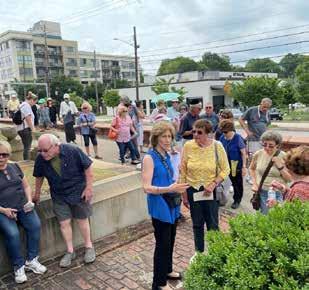
Since 2008, Solomon has chaired the quarterly blood drive at Ahavath Achim Synagogue, which regu larly falls around her birthday. Solomon said, “This year, it actually landed on my 80th birthday which made it a perfect way to give back and celebrate turning 80 at the same time. My goal is to live to be 100 and be healthy and active.”
The blood drive is also co-sponsored by: the Jewish War Veterans, Post 112; Fulton Lodge No. 216 F&A; and congregations Shearith Israel and Or VeShalom, which has sponsored 54 blood drives, and collected 3,269 units of blood from 3,425 total donors.
Solomon said, “Being a blood donor costs you only an hour of time. Not only do you save lives, but you also get a mini-physical when you donate. Donating blood is giving the gift of life. There is no greater gift.”
Solomon has donated 111 pints of blood. When her mother had colon cancer surgery, she needed seven pints of blood on the operating table to survive.
Solomon continued, “What, if then, the blood was not available? Someone needs blood every two seconds. There is no synthetic blood. Donating blood is doing a mitzvah, giving of yourself to someone you don’t know and someone who will never know the donor, but some one whose life you have saved. One pint of blood can save up to three lives.”
To coordinate with her outsized birthday, and as a huge Disney fan, Solomon entered a contest with WSBTV to win a cruise on the Disney Wish, their newest cruise ship.
She explained, “Every morning they gave a word that had to be texted to a number to enter. Both my daughter, Caren, and I did just that…she actually won a trip for four. This year, in addition to celebrating my
80th birthday, in November, my oldest son celebrates his 55th and my youngest son celebrates his 50th birth day, so nine members of our family are celebrating the November birthdays on the Disney cruise in January.”

On her first Disney cruise, Solomon celebrated her 60th birthday. She said with emotion, “That was the most family bonding we have ever taken.”
Solomon also volunteers at the Georgia Aquarium, but her “happy place” is working at Mercedes-Benz Stadium where she welcome guests at the South VIP entrance for special events and guided tours of the sta dium.

She said, “Mercedes-Benz Stadium is the only plati num LEED (Leadership in Energy and Environmental Design) certified stadium in North America. Arthur Blank’s vision to build the stadium, an icon in down town Atlanta that would bring people and communities together in an environmentally sustainable way, is truly a gift to Atlanta. The stadium will be a Zero Waste sta dium by the end of this year.”
When asked about her secret to longevity, Solomon shared: “To me, the most important things are a positive attitude and the choices we make every day. I wake up and chose to do aerobic exercises every morning. I feel that doing aerobics helps my body, heart, and brain. I combine it with strength training and stretching. It gives me natural energy which keeps me young in mind, body, and spirit. In every situation, I look for something positive. And helping others is what makes me happy. Life is not about what happens to you, but how you choose to react to the circumstances.”
Solomon is also credited with starting the success ful Mature Active Adult Community at Ahavath Achim. She remarked, “COVID happened, and we were all forced to shelter at home. Keeping in touch with the se nior members of the congregation and planning Zoom programs kept us all connected with activities to which we could look forward.”
Count the rather numerous candles, Gail, on be coming a proud octogenarian heralded for your good deeds! ì




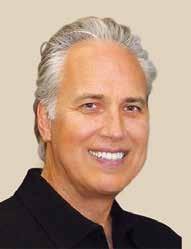
 By Marcia Caller Jaffe
By Marcia Caller Jaffe

A serious seniors advisor by day, Dyan Burnstein dove into her dream of being a stand-up comic. Through the years, folks around encouraged her as “a natural tal ent.” Burnstein said, “I have a great sense of humor, and my friends and family have told me I needed to try standup comedy. It has been on my bucket list for a long time. Recently, my sweet, smart, and wonderful mom passed away, and I thought this was the right time to bring laughter into my life and others." Her show "Laughter is the Best Medicine” went live at the Punchline Come dy Club on Roswell Road on Oct 23. And yes, the audience roared with laughter.
Burnstein got her comedic training by taking the Jeff Justice Comedy course for 6 weeks, 3.5 hours each class and the final Oct. 7 graduation. She stated, “It cost $599 and worth every penny. I put a total of 42 hours which included time out of class and rehearsing on my own.” Her routine lasts a full five minutes which can equal an eterni ty on stage. Her best topics are embarrassing her grown kids and ex-husband, working in the hospice setting with doctors, perform
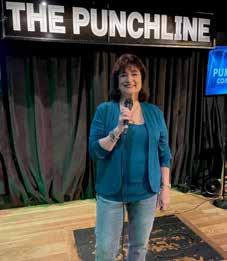
ing her winning cackle from the Renais sance Festival for which she won the Grand Prize which was televised on national news.
She furthered,” As a rookie I am per forming at a slower pace to produce a flaw less delivery. I use hand gestures, and I am also very animated, which helps make the jokes even funnier.” As she is busy writing new material, she plans to extend past the five minutes. She offered, “I learned how to properly develop a joke as professional com ics do. It is so much fun to start with a prem ise, build jokes around it, and make a lot of people laugh! Being funny is not the same as doing standup comedy. There are important steps to take if you are going to do it right.”
Some famous comedians have ex pressed the unique fear of standing on the stage solo with no props. Dyan overcomes fear by meditating the whole week before going on stage. She jokingly adds, “I do this to get out of my comfort zone. Unfortunately, I threw up a few times before, and now I am good to go without any stomach upset. “She only had one joke that she felt “bombed” slightly. “It was about a groom saying ‘con stipated’ unto me to his bride instead of ‘consecrated’ unto me,’ true story.” Her
children came to the show from Texas and California and said, “Mom, you crushed it!”
Originally from Little Neck, New York the family moved to the Main Line area of Philadelphia where she attended Temple University. Currently she is a family advo cate with Atlanta Senior Advocates assist ing families in finding the best fit in inde pendent living, assisted living and memory care. She concluded, “I am very passionate about my work, as I recently went thru this journey with my own mother. My services are complimentary. Being a comic helps take the edge off my clients, as they are go ing through a very overwhelming journey.”










Dyan leaves us laughing.
“When I was working in hospice, doc tors asked me if I pronounce my name “die in?” Yes, I am ‘die in’ to help you with your hospice patients. As I said, my name is Dyan (spell name) people tend to call me Di which is not the best name to have when you work in Hospice! People would be looking for me yelling down the hospice halls, Di Di!
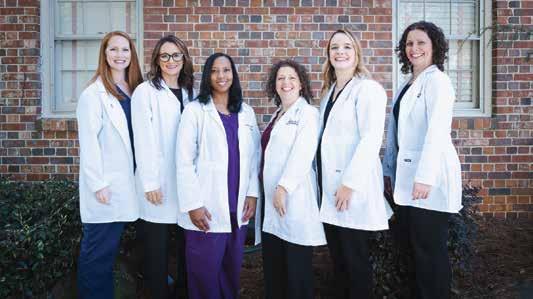
Then there’s meeting men on planes.





Flying is a great place to meet men, espe cially during turbulence. When I fly, I wear something low cut and a really bouncy bra

to showcase the GIRLS. This also gives me the excuse to hold the hand of the adjacent man. On my last flight, I missed his hand and grabbed something else. The look on his face told me he was enjoying the ride. When the flight attendants yelled ‘grab your an kles and put your head between your knees’, the entire plane was screaming and crying …well, everyone but him, he just smiled." ì



Jewish Women’s Torah and Tea – 7:45 to 8:45 p.m. Join the Jewish Women’s Circle of Decatur for a weekly discus sion on the Parsha and contemporary Jewish issues. Find out more with the Chabad of Decatur at https://bit. ly/3T8oR4B.


TBT Tikvah Tots – 10 to 11 a.m. Bring your little one for play time at TBT! Up to age 5. Get more information at https://bit.ly/3EcyGc2.

B’nai Torah & Israel Bonds Honor Trac ey & Sammy Grant – 6 to 8:30 p.m. Congregation B’nai Torah and Israel Bonds Dinner Reception. Purchase tickets at https://bit.ly/3EeUWSY.

SOJOURN’s Drawing from the Well – 12 to 1 p.m. Drawing from the Well is SO JOURN’s inclusive weekly meetup for LGBTQ+ Jews and allies. Participants gather in community to discuss and connect around resources from Torah. Learn more at https://bit.ly/3Dn6Qbv.
Baby & Me Music Class 10:30 to 11:30 a.m. Join Temple Sinai for a Baby & Me music class series–all babies and caregivers are welcome to join! The class will embrace the natural mu sicality we are all born with and is a great way to connect with your little one and other families, while enhanc ing brain development and social and cognitive tools. Register at https://bit. ly/3Dr3XX7.

Maria Schneider Orchestra – 8 p.m. This 2019 NEA Jazz Master and Gram my Award–winner leads the 18-mem ber big band orchestra in an evening of lush and complex works, including a world premiere commission in hon or of the Schwartz Center’s 20th anni versary. Purchase tickets at https://bit. ly/3SPagcN.

Alyson Richman and Shaunna Ed wards – 12 to 1p.m. Book Festival of the MJCCA Presents Alyson Richman and Shaunna Edwards, The Thread Col lectors: A Novel. Purchase tickets at https://bit.ly/3gT3sO1.

MJCCA Book Fest: Dr. Michael Roizen –7:30 to 9:30 p.m. As the human lifespan expands and more people are living to 100 years and beyond, author Michael Roizen, M.D., explains how to prepare for a longer, healthier future. Pur chase tickets at https://bit.ly/3SRsKtm.
Matt Paxton, Keep the Memories, Lose the Stuff: Declutter, Downsize, and Move Forward with Your Life – 11 a.m. to 12 p.m. Join the MJCCA Book Festival and America’s top cleaning expert on A & E’s “Hoarders” and star of the hit PBS series “Legacy List with Matt Paxton.” Learn more at https:// bit.ly/3gOBpze.
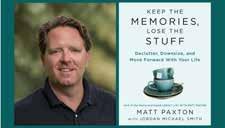
POW: EmPOWering Workshop for Women – 11:30 a.m. to 1 p.m. POW!’s main focus is to help moms and care givers take pragmatic (logical) steps to create a more manageable life for themselves. We will help you fill your toolbox with sustainable strategies for daily success within a supportive and spiritual group setting. Join JFCS by Zoom and register at https://bit. ly/3Tqq3zy.
Shabbat, Me & Rabbi G at the JCC! – 5 to 5:30 p.m. Bring your children to the JCC for a Shabbat celebration featuring fun songs and blessings with Rabbi G! Challah and grape juice are served. Learn more at https://bit.ly/3UJz8ET.

Tot Shabbat and Kiddush Lunch - 11 a.m. Join Congregation Beth Shalom for an interactive Tot Shabbat and sing, play and engage in fun activi ties, followed by a wonderful Shabbat Kiddush lunch together. https://bit. ly/3rBWd03.
Torah Reading: Chayei Sarah
Friday, November 18, (Cheshvan 24, 5783) Light candles at 5:14 p.m. Saturday, November 19, (Cheshvan 25, 5783) Light candles at 6:11 p.m.
Torah Reading: Toldot
Friday, November 25, (Kislev 1, 5783) Light candles at 5:12 p.m. Saturday, November 26, (Kislev 2, 5783) Shabbat ends at 6:09 p.m.
Nyle DiMarco, Deaf Utopia: A Memoir -and a Love Letter to a Way of Life – 8 to 9 p.m. Nyle DiMarco has been break ing down barriers and winning over audiences since 2014, when he became the second male winner and first deaf contestant on cycle 22 of America’s Next Top Model. Purchase tickets by visiting https://bit.ly/3zYkwci.

Thanksgiving Event with Chef Howard 1:30 to 3 p.m. Join PJ Our Way, In the City Camps and Chef Howard for an afternoon of pre-Thanksgiving bak ing fun (Kosher/Dairy) with our own ITC Chef Howard!! Your tween (Kids ages 9-12) can hang out with their ITC friends – and meet new ones! Register by visiting https://bit.ly/3Uho41l.

Where an endlessly inspiring setting, a wealth of activities, first-class cuisine, innovative wellness and attentive service live under one stylish roof with on-site supportive services. It’s all here at The Piedmont at Buckhead senior living community. A place built for all that makes you, you. Learn more at our upcoming event.
LUNCH & LEARN Thursday, December 8th • 11:30am Join us for an informative presentation on senior living. Afterwards, take a tour of our beautiful community and enjoy a delicious lunch. To make a reservation, please call 404.496.5492 .
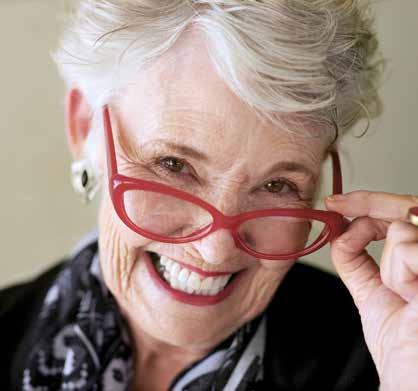
Kabbalah & Coffee - 9:30 to 11 a.m. A Weekly Study Series with Rabbi Ari Sollish and Young Jewish Profession als Atlanta. Discuss, explore, and jour ney through the world of Jewish mys tical teaching. For more information visit https://bit.ly/3LP4o11.


Anat Cohen Quartetinho - 4 p.m. Hail ing from Israel, the U.S. and Brazil, this new quartet at the Breman expands the deeply rooted Brazilian influences of Cohen’s music. Purchase tickets at https://bit.ly/3NKye84.

Menorahs + Martinis -7 p.m. Pre-Cha nukah night out for YOU! Enjoy a fun night out with Young Jewish Profes sionals Atlanta creating a stunning and unique granite menorah while relaxing with community, friends, and a good drink! Register at https:// bit.ly/3tbqJh2XX..
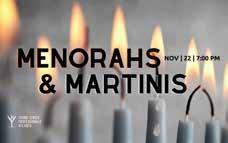
Turbo Turkey – 8:30 to 10 a.m. Get a taste of the MJCCA Group Fitness offerings during our energy-boosting 90 min turbo turkey workout. Come early and enter a drawing for MJCCA swag. Learn more at https://bit.ly/3ThUqri.

Tot Shabbat and Kiddush Lunch - 11 a.m. Join Congregation Beth Shalom for an interactive Tot Shabbat and sing, play and engage in fun activi ties, followed by a wonderful Shabbat Kiddush lunch together. https://bit. ly/3rBWd03.

Kabbalah & Coffee - 9:30 to 11 a.m. A Weekly Study Series with Rabbi Ari Sollish and Young Jewish Profession als Atlanta. Discuss, explore, and jour ney through the world of Jewish mys tical teaching. For more information visit https://bit.ly/3LP4o11.
In Your Time- 12 to 1:30 p.m. This is an open-ended process group for femaleidentified singles in their late-twenties to mid-thirties to work on developing an acceptance practice and learning how to embrace where we are in life. Cost is $35 a session. See https://bit. ly/3b95YwV for more information.
Conversational Hebrew - 6:45 to 8:30 p.m. Learn Modern Hebrew and Prac tice your Skills with a Beloved Hebrew Teacher from Temple Beth Tikvah. This Class Promises to be Engaging, Informative, and Enjoyable. Register at https://bit.ly/3DUkMf6.
Jewish Women’s Torah and Tea – 7:45 to 8:45 p.m. Join the Jewish Women’s Circle of Decatur for a weekly discus sion on the Parsha and contemporary Jewish issues. Find out more with the Chabad of Decatur at https://bit. ly/3T8oR4B.
SOJOURN’s Drawing from the Well –12 to 1 p.m. Drawing from the Well is SOJOURN’s inclusive weekly meetup for LGBTQ+ Jews and allies. Partici pants gather in community to discuss and connect around resources from Torah. Find out more at https://bit. ly/3Dn6Qbv.
Rosh Chodesh
Believe In Yourself.- The Rosh Chodesh Society’s upcoming course, TO Believe OR NOT TO Believe In YOURSELF, introduces the students to Tanya, a 225-year-old text whose portrayal of human psychology in general, and of our inner spiritual composition in particular, remains as revolutionary—and as refreshing— as ever. Register with Intown Jewish Academy at https://bit.ly/3Tisns3.

Virtual LinkedIn Workshop – 10 a.m. to 12 p.m. Join JF&CS for a 2-hour virtual LinkedIn Workshop designed to give job seekers and those in career tran sition a solid base of information to strengthen their brand on LinkedIn. Register at https://bit.ly/3NJd4HH.

Community of Giving – 12 to 1 p.m. Com munity of Giving is a virtual fundrais ing event with programming focusing on our own client stories, with our services featuring guest host Mara Davis. Purchase tickets at https://bit. ly/3zUKiOG.
JF&CS Community of Giving 2022: A Virtual Gathering – 12 to 1 p.m. Ev ery year, JF&CS supports more than 14,000 men, women, and children in our community. Please join us on Giv ing Tuesday for our 2nd Annual Com munity of Giving: A Virtual Gathering. Learn more at https://bit.ly/3DPsqFM.
Jewish Women’s Torah and Tea – 7:45 to 8:45 p.m. Join the Jewish Women’s Circle of Decatur for a weekly discus sion on the Parsha and contemporary Jewish issues. Find out more with the Chabad of Decatur at https://bit. ly/3T8oR4B.


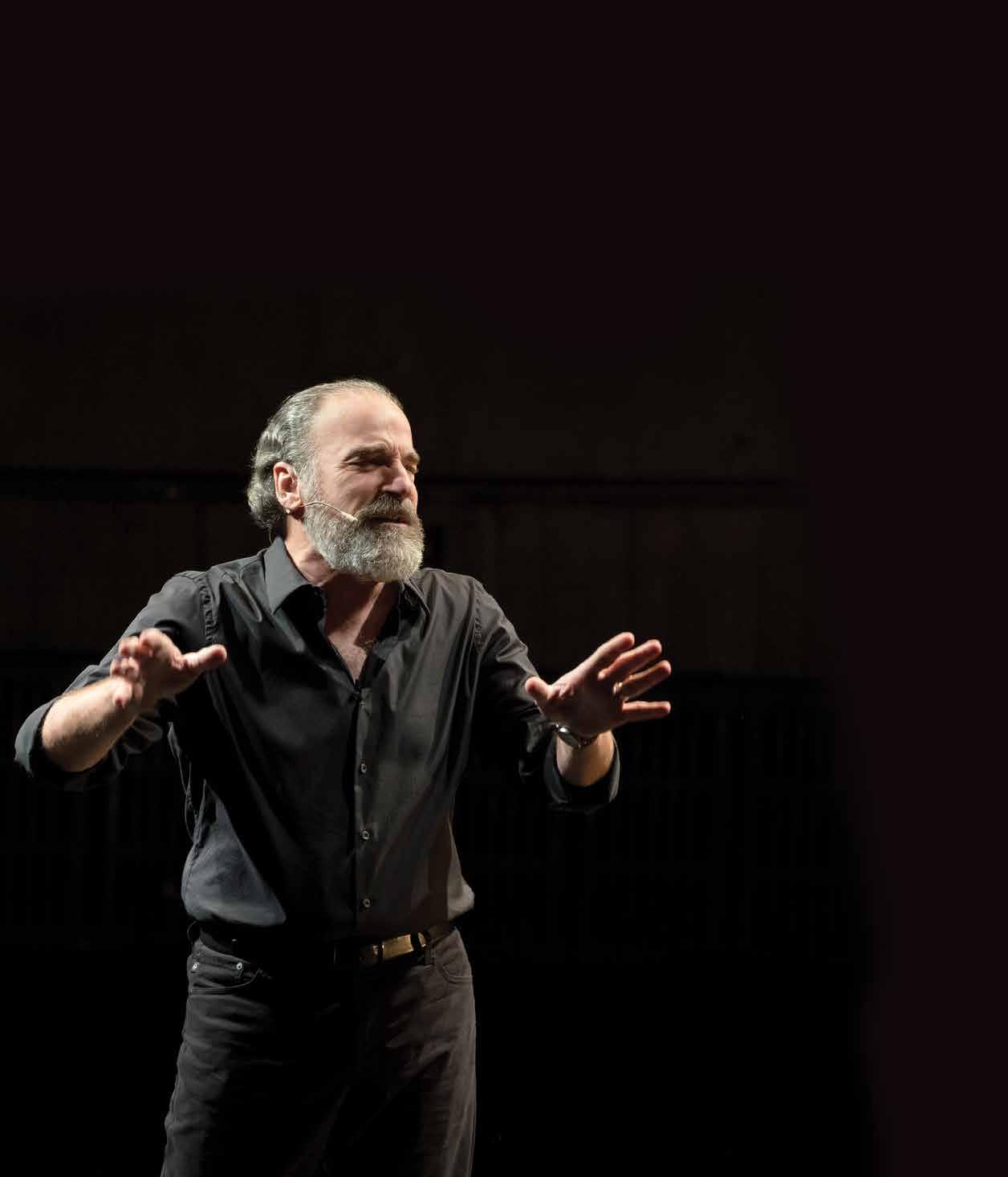


The

Statue of David Sassoon, 1865, by Thomas Woolner, in the David Sassoon Library, Mumbai // Photo Credit: Helen Jackson
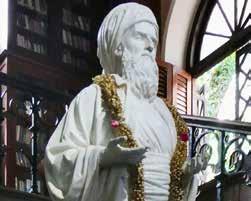
Albert Sassoon, caricature by Spy (Leslie Ward) from Vanity Fair, 1879 // Photo Credit: Chronicle/Alamy
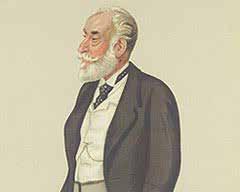
In a conversation with Joseph Sassoon, a descendant of the Jewish Sassoon family dynasty and the author of “The Sassoons: The Great Global Merchants and the Making of an Empire,” we take a deep dive into one of the most fascinating stories of wealth, fortune, and downfall in Jewish history. Joseph’s passion for discovery led him to an untapped trove of archival material about his extended family, and his ability to read in English, Arabic, and Hebrew led him to writing the history of the Sassoon ancestry. Joseph is a professor of history at Georgetown University.
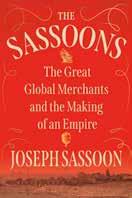
Tell us about the Baghdadi Sassoons of India and how they built an empire, family dynasty and became one of the richest families in the world?
It all started with David Sassoon who fled Baghdad in 1829 because of a conflict with the corrupt Ottoman governor of the province of Baghdad. From his new home in Bombay, David gradually started a trading business. Relying on his 14 children, he built a trading network in cotton, textiles, opium, tea and other commodities. By the time he died in 1864, the family enterprise was a global merchant with a meaningful market share, particularly in cotton and opium. David left a significant fortune for his children: £4 million (about $30 million), which would be roughly $500 million today, or $3 billion calculated by labor or income value.
How important was it for the Sassoons to be Jewish? Share how the founders and great-granddaughter, Flora (Farha Sassoon), who was the first CEO of the world in global business, celebrated their Jewish values?
David was profoundly attached to Judaism and was uncompromisingly observant of Jewish law and practice. He was a devoted student of the Talmud and insisted that all his sons had a thorough Jewish education. A few years before his death, David built a synagogue in the neighborhood where he resided. His great granddaughter, Farha, who Anglicized her name later to Flora, was extremely knowledgeable about Jewish texts and was fluent in seven languages. In 1924, she was the first woman to address the graduation of a seminar, of rabbis in London. She showed her tremendous knowledge of the Bible and the Talmud in her speech to the seminary.
As a professor of history, what drove you to untap the archival treasure trove of history about your family? It all began with a letter sent to me by a Joseph Sassoon who was interested in our shared name and wanted to know if we were related. Conversations with him whetted my appetite and as a historian, what really tipped the balance was the discovery of a trove of untapped archival material containing thousands of documents dating from 1855 to 1949: everything from personal letters to account books and menus for dinner parties. Most of the business correspondence was written in Baghdadi-Jewish dialect using Hebrew characters to prevent outsiders from reading their letters.
When the Sassoons moved in the 19th century to England, the Sassoons were knighted. How did they become members of the British parliament? David’s eldest son, Abdallah, was knighted in 1872 and became Sir Albert, a title which was passed down through the generations. An extravagant party for more than 1,000 guests was held at his house in Bombay also to celebrate the new Viceroy of India. Later, Jacob, David’s grandson from Elias, was also knighted.

What happened in 1887 between the Sassoons and the banking empire of the Rothschilds?
Marriages play an important role in consolidating business relations, strengthening political ambitions and providing an extra layer of security and diversification. One example was the marriage that tied the Sassoon and Rothschild families together. The wedding was of Albert’s second son, Edward, to Aline Caroline, daughter of Baron Gustave de Rothschild of Paris, on Oct. 19,1887. The ceremony was conducted by the Grand Rabbi of France and attended by 1,200 guests who were entertained at the recep tion by the Paris Opera chorus. The groom gave the bride a pearl necklace costing about $1,150,000 in today’s value.
You also were born in Baghdad. How did your family escape from Baghdad in the 1970s to avoid Saddam Hussein’s regime?
After the Six Day War in June 1967, life for Jews in Iraq grew increasingly untenable. The rise of the Ba‘ath Party a year later exacerbated the situation and public hangings of Jews followed in 1969. When we finally managed to escape a few years later, we left with nothing except for a small bag, closing the door not only on our property but on a land where my family had lived for centuries.
If we learn one thing from your family’s history, what do you want us to remember?
I hope our family’s legacy will be remembered as the capability of migrant families who left with nothing but managed to conquer the world through sheer hard work and determination.
By Robyn Spizman GersonEnd-of-year giving is about much more than rushing to meet a December 31 deadline. It’s about having a solid philanthropic investment plan. Atlanta Jewish Foundation is here to help you create one.
You can turn cash, real estate, or other investments into powerful charitable gifts through a donor-advised fund (DAF)—your charitable “checkbook.” Don’t have a DAF? We’ll get your started!
We can partner with you and your financial advisor to create a charitable giving plan that will most benefit you and the causes you care about.
Invested in JewishATL


Preference: Parve
Difficulty: Easy Cooking and Prep: 50 minutes
Serves: 4

Ingredients (4)
3 onions, cut
2 to 3 large sweet potatoes
1 cup almond or oat milk
1 teaspoon cinnamon
Cut the onions, put them in a pot and cook them in a small amount of water until translucent.
Peel and cut the sweet potatoes. Add them to the pot and cook for about five to eight minutes.
Add water to just cover the sweet potatoes. Bring to a boil, then simmer for about 25 minutes until sweet potatoes are soft.
Add the cinnamon.
Put the entire mixture in a blender or use an immersion blender and blend.
Return to the pot and add the almond or oat milk.
Recipe By Rivka Golombeck Photo by Rivka Braverman Source: Kosher.comMoshe goes for a walk in the woods. Suddenly, a six-foot-tall grizzly bear appears and approaches him at quite a fast pace. Moshe stands there petrified and begins praying for his safety. But then Moshe notices that the bear has stopped, has put on a kippah and has also started praying. Saved!
But as Moshe approaches the bear with an outstretched hand to greet a fellow Jew, he hears the bear concluding the motzi, the traditional prayer before eating.
From Oy! The Ultimate Book of Jewish Jokes by David Minkoff
n. A person who is forever complaining about their health even if they seem to be perfectly well. A noisy hypochondriac.
"Milton was whining about his teeth all day. Yesterday it was his hemorrhoids. such a krank crank he is, I'm telling you, I can't tell you."
From the Yiddish krank, meaning sickness.
From: Schmegoogle Yiddish Words for Modern Times by Danirl Klein
Foe of 73-Across...or the Queen of Sheba to Solomon, perhaps?
Swedish furnisher
Sauce for a sushi chef
Mythological queen
Beantown classical music grp.
Common rhyme scheme
Real name of Bob Kane, the creator of 73-Across
Fila alternative
Words with carte
Heavy emotional baggage
Lincoln bit
Those with Y chromosomes
Possible nickname for Alex Breg man or Joc Pederson...or another title for this puzzle
Eight, in Spain
Collective pronoun

Language of southeast Asia
D.D.E. defeated him
“You got it!”
Son two of eight to Abraham

Joseph in Egypt, for a while
Friend of 73-Across... or bird that’s OK to use for the mitzvah of shiluach haken
Second of two sections
Bagel’s center
Famous Abba
“Oz” creator

Morning/night tefilla
Ill-fated son of Judah
Ancient kingdom (and current state)
One was used instead of 53Down
“La la” lead-in
Phyllis Alterman Franco passed away peacefully at her home on Nov. 1, sur rounded by her children, grandchildren, and Richard Franco, the love-of-her life and husband for sixty-three years. She was 84. Phyllis was so many things to so many, but always an artist. Through her works and dynamic, insightful way of engaging, she explored the contradictions of life, creating lasting beauty not only in her paintings, but more importantly to her, in the connections she fostered and to which she gave enduring understanding and profound acceptance. Phyllis was a force for goodness. Her children, family, friends and community will miss her dearly.
The daughter of the late Sara and Dave Alterman, Phyllis graduated Salutatorian of the 1956 graduating class of Henry W. Grady High (now Midtown High School) and Phi Beta Kappa from Emory University in 1960. She attended Northwestern Univer sity her first two years of college but returned to Emory to be closer to Richard. She later pursued graduate studies at Georgia State University receiving her bachelor’s and Master’s in Visual Arts, Magna Cum Laude in both in 1981 and 1983 respectively. In addition to her roles as mother, wife, homemaker, philanthropist, and active mem ber of the Jewish community, Phyllis became a prolific, disciplined artist. Family, memory, and loss were central to Franco’s art.
The unique approach Phyllis and Richard and their family took to Phyllis’s Al zheimer’s, connecting through Phyllis’ love of the piano and painting and using the strength and tenderness of the couple’s partnership to adapt to the changes together, was well documented. During her decade and a half with the condition, Phyllis and Richard could be seen daily on walks; their days were a love affair with the City of Atlanta as well as with one another. Along with making art full-time, Phyllis loved playing the piano years into her diagnosis, playing tennis, exploring her Judaism, and hosting countless celebrations. She and Richard were also world travelers, often choosing to explore other countries by bicycle with life-long friends. Phyllis was selfeffacing, humble, accepting of others, devoted, dutiful, and the truest of friends.
In addition to her husband and partner in adventures, Dr. Richard Franco, Phyl lis is survived by her three children and their spouses, Lewis Franco & Heidi Thomp son, Rebecca & Henry Chalmers, Meryl Franco & Sam Worley and grandchildren Lou isa, Sarina, Joseph and David. She is pre-deceased by her parents and brother Stephen Alterman and infant brother Alvin Alterman. She is survived by brother Richard Al terman and his wife Marty, and Stephen’s widow Marci Ball. Her husband Richard’s family became her own. She is predeceased by his parents Joe and Rachel Franco and survived by brother- and sister-in-laws Ramon & Jody Franco, Renee Franco, Robert & Sara Franco, and Rita & Craig Gilbert along with scores of nieces and nephews, and exceptional friends. The family would like to thank Lucy Rengifo and care-giver Gwen Brown for their years of friendship and service. Graveside services were Nov. 2 at Greenwood Cemetery. Donations can be made to Weinstein Hospice, Ahavath Achim Synagogue, NERANENA, and The Piedmont Park Conservancy. Dressler’s Jew ish Funeral Care, 770-451-4999

Lillian Sylvia Gross born Feb. 5, 1930, in Homeville, PA to the most wonderful par ents, Rose and Zoltan Smooke of blessed memory, died Nov. 7, in the care of her loving family and caregiver Ebere Victoria. Sylvia AKA, ‘Double’, a moniker she acquired from her toddler grandsons exemplified generosity of spirit, unconditional love, val ues of open doors and welcoming the stranger. Double grew up with her brothers and sisters, Allen, Jerry, Betty, and Fay all of blessed memory in the wild Steel Towns of Homeville/ Homestead, and finally the Oakland Neighborhood of Pittsburgh, PA. Her father used to brag that he was a “5x millionaire” to explain how much he adored his children.
At 18, Double met and married the love of her life, Ben Gross, a Hungarian ‘HandGrenade’. Double dedicated her life to helping Ben and his siblings, all survivors of the Holocaust, rebuild their shattered lives. She read and wrote for him. They raised four children: Cindy, Marcie, Howard (of blessed memory) and Michael. She and Ben were a team and she learned quickly how to manage a household and be a Lady Kosher butcher. Together they operated Ben Gross Kosher Meats on 5th Avenue in Pittsburgh, PA into the late 1950s.
In time, Ben joined his brothers at Albee Homes in Youngstown, Ohio and trav eled the country while Mom dedicated herself to holding down the fort. In 1963, Ben accidentally boarded a plane to Atlanta when he meant to fly to Atlantic City to open a model home. He looked around and the brothers decided to invest in exurban real estate. In 1967 the family finally moved to Atlanta. Double persevered through the ups and downs of economic peaks and valleys managing the family finances while never losing her warmth and sense of humor. She always made sure that the kids had money in their wallets and there were charity dollars by the front door even when money was very tight. She was a great family finance manager with only a high school education.
Double exemplified loving kindness (Chesed) and created a warm and welcoming home in Atlanta. She taught us the importance of visiting the sick and elderly, com munity involvement in meaningful ways that did not always attract attention, and she showed us the value of volunteering with a smile.
She really loved bowling with her dear friend Helen Gerson (of blessed memory) and they delighted in telling all about their high scores and gutter balls. They loved their bowling league teammates and made every effort to attend the end of season parties.
Double was a lifetime member of Na’amat and served as President of the lo cal chapter many times. She was named an Atlanta. Jewish Federation Woman of Achievement and was an honoree of SOJOURN for her dedication to supporting the rights of the LGBTQ+ community.
Lillian Sylvia Gross was predeceased by her husband Ben, her beloved son How ard, and her sisters and brothers she adored. She is survived by Cindy Solomon, Mar cie Koffler (Barry,) Michael Gross (Bryan) and Cathy Gross (Howard z’ll.) She will be missed by her beloved Grandchildren Max (Jennifer,) Aaron (Chanyl,) Lucy (Michael,) Zak (Luca,) Micah (Jason,) and Caleb (Margalit,) and the lights of her life great grand sons Charlie Hugo Gross and Pax Anic-Koffler. Funeral services were held at 2 pm November 8th at Crestlawn Cemetery.
770.757.0330 office 770.289.0982 cell brook@rmemorials.com www.rMemorials.com
Brook Bolton has been serving the Jewish community for over 20 years with the finest stone monuments and bronze markers available.
Now with his new company, Remembrance Memorials, his core values of Quality, Compassion, and Lower Cost still hold true. Call today for free consultation on your needs.

There will be a hole in our hearts, but we will forever carry with us her spark, her love of life and people, and the kindness she taught us was so important to creating lasting connection with others. We love you Double. Dressler’s Jewish Funeral Care, 770-451-4999, www.DresslerJewishFunerals.com.

Dr. Richard Michael Kotler, loving and caring husband, father, grandfather, and friend, passed away peacefully on July 26. He is survived by his wife of 35 years, Helen Ann Kotler, his children and their spouses, Amy Hunter and her hus band, Paul; Joseph Kotler; Jeffrey Gartz man; Debra Gottlieb and her husband, Robert; his 6 grandchildren; Cameron Hunter; Nolan, Tyler, and Olivia Gartz man; Jon and Alex Gottlieb; as well as his beloved dog, Lucy.
He was born in Trenton, N.J. on Oct. 31, 1933, to Dr. Samuel Kotler, also a career dentist who taught orthodontics at New York University, and Ruth (Zaitz) Kotler. He loved growing up and working on his family’s large dairy farm in Hightstown, N.J., which provided milk to the local community and cows to smaller dairy farms in the greater central New Jersey area. It also nurtured in him a great love of all animals and nature, and an appreciation for the value of hard work.


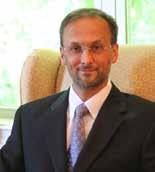
After attending The Peddie School, Dick received his undergraduate degree from Lafayette College and his DDS from the University of Pennsylvania School of Dental Medicine. Subsequently, he served in the United States Air Force as a captain.


Following his military service, Dr. Kotler was a well-known, highly regarded den tist in private practice in West Hartford and Bloomfield, Conn. for 40 years. He was adored by his staff whom he employed for most of their careers until he retired. In his semi-retirement years, Dick capped off his 50-year dental career at the New Britain Hospital for Special Care in Connecticut, and then at the V.A. Hospital in Atlanta and Fort Benning, Ga.
As lifelong residents of the northeast, Helen and Dick lived together in Farming ton, Conn. for 16 years until they relocated to Atlanta in 2004. They quickly adapted to and embraced their new life in Georgia, working, socializing, and developing many wonderful friendships.
Beyond his many professional accomplishments, Dick was a very talented artist, photographer, painter, sculptor, and poet. He appreciated and enjoyed theater, music, and dance, the latter of which was on full display when Dick and Helen won a Lindy Hop contest in Montreal on New Year’s Eve, circa 1999. In addition to Canada, Dick’s travels with Helen to Europe, Israel, and across the U.S. were exciting and rewarding. He was devoted to the teachings of Torah and the ideals of Judaism, observing and honoring Shabbat and all Jewish holidays, while maintaining a kosher home. Dick was also very charitable, especially with many Jewish, humanitarian, and veterans’ organizations.
More than anything, Dick loved spending time and building a life with his wife, Helen, with whom he shared a wonderful marriage, and with his children, grandchil dren, many close cousins and friends, dog Lucy, and predeceased dog, Snoopy Ann.
Dick was a man of great character, honest, fair-minded, intellectually curious, and deeply caring. He was a big baseball fan, rooting for the Boston Red Sox since childhood and then also his hometown Braves after moving to Atlanta. Dick was well-known for telling silly, corny jokes which made everyone smile (and occasion ally groan). He had a warm and gentle heart, was loved immensely, and will be sorely missed. His memory will always be a blessing.
Funeral services have already been held in Dick’s honor. Donations may be made to Jewish Family & Career Services, The Temple, or any veterans’ organization.



Eleanor Evens Levy, 86, formerly of Columbia and Charleston, S.C., passed away, Sunday, Oct. 30, in Atlanta, Ga. Born to Sam and Annie Kessler Evens on July 23, 1936, in Pulaski, Va., she graduated from Pulaski High School, and attended University of North Carolina-Greensboro. In 1955, she married the love her life, Dr. Joel Steinberg Levy, in Roanoke, Va., who preceded her in death in 2012.
A member of Beth Shalom synagogue for her entire adult life, Eleanor also served as sisterhood president. She was also a member of Hadassah, the Columbia Bridge Club, and Synagogue Emanu-El of Charles ton. A life master bridge player, as was her husband, she won numerous trophies. El eanor and Joel also volunteered for many years at Providence Hospital, and the JCC.
In their 57 years of marriage, they traveled extensively and kept a warm, open home for family and friends. Eleanor, known for her creativity and artistic ability, was a loving wife, mother, grandmother, aunt, and friend to many. After Joel’s death, she moved from Columbia to Charleston where she resided at Bishop Gadsden. There, she enjoyed many years of new friends and activities.
Eleanor is survived by her daughter and son-in-law, Elisa Levy and Miles Rich, of Atlanta, her son and daughter-in-law, Elliott and Heather Levy, of Charleston; her grandchildren, Aiden, Andrew and Anna Levy, and Leo Rich; her brother-in-law and sister-in-law, Dr. Ted and Sue Levy, of Delray Beach, Fla.; and nephews, nieces, greatnephews and nieces, and cousins.
Eleanor was preceded in death by her parents, husband, brother and sister-inlaw, Dr. Nathan and Frona Evens of Richmond, Va., and sister and brother-in-law, Selena and Morton Jacobson of West Palm Beach, Fla.
In lieu of flowers, the family asks that contributions be made to Congregation Beth Shalom in Columbia. Graveside services were held at 3 p.m., Nov. 1, 2022, at Co lumbia Hebrew Benevolent Society, 714 Blanding St., Columbia, S.C. Arrangements made in Atlanta by Dressler’s Funeral Care, 770-451-4999.

Michelle Eva Garber Lewis passed away at home on Nov. 3 after a long and val iant fight with Leiomyosarcoma (LMS) cancer.
She is survived by her husband Craig Lewis, sons Sean and Matthew, sister Mar sha Epstein along with many nieces, nephews, aunts, uncles, cousins, and brothers and sisters-in law.
Michelle was predeceased by parents Sam and Esther Garber, siblings Yvette Shure, Sharon Halpern, and Stanley Garber.
Michelle was born and raised in Atlanta and attended the Hebrew Academy and then the University of Georgia where she met Craig, her husband of 30+ years. After five years marriage, Michelle and Craig created the Atlanta Pet Resort from a little plot of land in Marietta, which they owned, operated, and loved for 25 years and sold in 2021.
Her proudest accomplishment was with her husband raising their two strong, caring, and amazing boys.
Michelle was the glue that kept and brought their family together from around the world. Her house was always open. “Michelle radiated positivity.” She had friends from all walks and stages of her life. From her American Class in Israel to the Mom mies group, the Matthew’s mom group, the Sexy Six, and high school and college friends. Michelle never met a stranger and would make friends at the drop of a hat.
Michelle will be missed by those near and far for her “Sunshine,” and her fiery, intense, loving, caring and open heart.
Our world has dimmed since you left us, but I know your family will shine so much brighter now that you are with them.
Many thanks to her dear friends for the continued support of her family. Many thanks to WellStar Hospice for their care of Michelle on this last leg of her journey. Arrangements by Dressler’s, 770-451-4999 www.dresslerjewishfunerals.com.
Ethel Marks (nee Ginsberg) of Atlanta, Ga., died on Oct. 27, after a sudden decline in health. Born in Brooklyn, N.Y., Ethel was the daughter of the late Louis and Sarah Ginsberg, immigrants from Old Russia. When Ethel was a young woman, she met Ir win Marks. Irwin loved Ethel from the moment he laid eyes on her. In 1943, they mar ried, and they remained married for 72 years, until Irwin’s death in 2015. During their final goodbyes, Ethel said, “I’ll see you up there.” “Yes, but not so soon,” Irwin replied.
Ethel was a simple and elegant woman who enjoyed traveling, shopping, and fine design. She was an exceptional mother, loving wife, and amazing friend to all who knew her. She is survived by sons, Michael Marks, and Steven Marks, two grand daughters and four great-grandchildren. May her memory forever be a blessing. Me morial donations may be made to The Dementia Society of America, PO Box 600, Doylestown, PA 18901 USA. A graveside funeral was held on Sunday, Oct. 30 at Ar lington Memorial Park in Sandy Springs with Cantor Donna Faye Marcus officiating. Arrangements by Dressler’s, 770-451-4999.
Lenore Goldstein Polk, of Griffin, Ga., and, in recent years, Warner Robins, Ga., passed away peacefully on Thursday, Oct. 27. Lenore was born in Charleston, S.C. to Katherine and Isadore Goldstein, on March 18, 1936. The family moved to Griffin, Ga. when Lenore was a teen, and they operated a family piece goods business, The Fab ric Center.
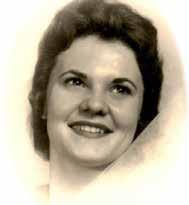
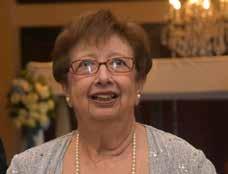
Lenore met the love of her life, Ira, at a Uni versity of Georgia sorority/fraternity party, and the rest was history. For 68 years, she echoed “GO DAWGS” every football weekend and was Ira’s biggest fan when he was on stage playing the saxophone. Affectionately known as “Bubbie,” her greatest joys were her children and grandchildren. She was an avid baker and gardener; local friends could not wait for her gift trays of baked goods every holiday season and her yard was always spec tacular with her perennial and annual plantings. She also had a gift for dancing, and you could always find her humming and dancing around the house.
Lenore was preceded in death by her parents, her sister, Sandra Goldstein Bemis, and her beloved husband, Ira. She is survived by her children, Debbie Ziesenhene, and her husband Greg, Sam Polk, and his partner, Bryan Ahlers, and Staci Flaxer, and her husband, Mark; grandchildren, Jenna Ziesenhene, and her husband, Jack Arnold, El len Ziesenhene, Abby Flaxer, and Janine Flaxer; and nephew, David Bemis.
Visitation for Lenore Polk was held at Conner-Westbury Funeral Home, 1891 W. McIntosh Road, Griffin, Ga. on Sunday, Oct. 30, 2022, followed by a graveside service at Crest Lawn Memorial Park, 2000 Marietta Blvd, NW, Atlanta, Ga., section B-Cedar Hill. In lieu of flowers, contributions may be made to The Alzheimer’s Association in memory of Mrs. Polk.
Please join the family and friends in honoring the life of Lenore Goldstein Polk by visiting www.conner-westburyfuneralhome.com and posting your tributes and memories.
A loving son, brother, and grandson, loyal friend, curious student, avid NBA fan and passionate movie and music buff, Michael Dittler Shlesinger was the Man. Born in Atlanta, Georgia on Dec. 4, 2001. Michael died unexpectedly on Oct. 26, at the age of 20. A seventh generation At lantan, Michael graduated from Suffield Academy in Connecticut and was a soph omore at Southern Methodist University studying Finance, Real Estate and Art His tory.
Michael was blessed with an entrepreneurial and creative spirit, constantly thinking of out-of-the-box ideas never ceasing to amaze both his friends and family. Although lost too soon, Michael lived life to the fullest, bringing unparalleled energy and excitement into everything he did. In a typical day he could spend hours in the gym, read fantasy, philosophy, and everything in between; drive around for hours with friends; and still manage to watch all of the football and basketball games with his dog Lucy by his side. He approached every day with a “can-do” attitude, his classic phrase “I got this” prevailing any obstacle in his way.
Michael was pre-deceased in death by grandparents J. Rhodes Haverty Jr., Nate and Joan Lipson, Irving M. Shlesinger, and Uncles’ Michael Lipson and Jay Dittler Shlesinger.
Michael is survived by his parents John and Sara Shlesinger, sister Abby, Grand mothers Elice Haverty and Joyce Shlesinger, Aunt and Uncle Sue and Danny Lipson, and cousins Mimi and Michelle Lipson and Andrew and Chris Lowell.

A graveside service was held on Nov. 2, Arlington Memorial Park. In lieu of flow ers, donations can be made to the Michael Shlesinger Endowment Fund, Eaglebrook School, 271 Pine Nook Road, PO BOX 7 Deerfield, MA 01342 and/or www.eaglebrook. org/giving/online-giving or to a charity of your choice.
James (Jim) Smulian passed away peacefully early in the morning (his favorite time of day) on Wednesday, Oct. 26, at the age of 94 (two weeks shy of 95). Jim was born on Nov. 7, 1927, in Baltimore, Md., second son of Pearl and Samuel Smulian. He attended public school in Baltimore until the start of the Second World War, when he entered Staunton Military Academy, Staunton, Va.
Jim played the French horn and the xylophone for several years with the Balti more Symphony Youth Orchestra. He had his own swing band as a teenager and of ten stated that Lionel Hampton was his idol. He attended the University of Maryland School of Engineering and Johns Hopkins McCoy School of Business from 1945-1949. While in college, he founded the Zeta Beta Tau fraternity chapter at the University of Maryland.
In 1951, he married the love of his life, Betty Forman, of Philadelphia, Penn., and they lived in Baltimore for seven years, where their oldest son, Rob, was born, before moving to Atlanta, where their second son, John, was born. In 1962, Jim and Betty started Trimblehouse Corp., an international lighting fixture manufacturing compa ny. Trimblehouse was known for its innovative custom interior and exterior lighting designs and Main Street projects bringing historic street lighting back to cities and towns across the country, including, and especially, Atlanta. The company flourished until 1998 when Jim and Betty retired and moved to Dahlonega, Ga.
Jim loved people and was always deeply involved in the community. Jim was a devoted Rotarian since 1961, serving as district governor of the North Georgia District 6910 and president of three Rotary clubs: Buckhead Rotary Club, Peachtree Corners Rotary Club, and the Dahlonega Sunrise Rotary Club. Jim was also incredibly proud to be the founding president of Atlanta’s Temple Sinai, which started in 1968, and has become one of the largest and most successful Reform Jewish congregations in the country. Jim served on the founding board of Northside Hospital, on the Sandy Springs Planning Council and the American Jewish Committee board, and was active in the Executive Committee, an organization of business CEOs, and in Junior Achieve ment, the Architectural and Engineering Society, and the Plastic Engineering Society.
Jim also served as president of the Atlanta Chamber Players board.
Jim was a loving, fun, and wonderful husband of 71 years to Betty, an amazing fa ther and father-in-law to Rob and Lynne and John and Elaine, and a delightful “Dadu” to Liz, Laura, and Jacob. Happily, Jim was able to meet his first great-grandchild, Eli jah, in September. Jim was a natural leader, loved working with his hands and build ing things, and thoroughly enjoyed engaging with people and connecting people to each other. The world is a better place for his having lived in it, and he will be so very deeply missed.
Donations in Jim’s memory can be made to Temple Sinai (Atlanta), the Dahlone ga Sunrise Rotary Club or The Northside Hospital Foundation. Funeral services were held Thursday, Oct. 27, 2022, at 10:00 a.m. at Temple Sinai, followed by a graveside ceremony at Crest Lawn Cemetery. Arrangements by Dressler’s Jewish Funeral Care, 770-451-4999.
Yvonne Teichman, 100, wife of Murray Teichman, passed away peacefully in her sleep in the comfort of her home in Atlanta on Oct. 30.
Born in 1922, the fourth of seven siblings, she was raised along with her four sisters and two brothers in Cairo, Egypt, where she married and had her first child, Brenda. After being widowed, Yvonne emigrated to New York through Ellis Island in July 1951. Soon after, she met and married Murray Teichman, adding two children to their family, Monique, and Bruce. They built a beautiful life together for over 67 years, in Brooklyn and Long Island, retiring to Florida and then moving to Atlanta in 2009 to be with their children and grandchildren.
Yvonne was not only fluent in six languages, but she was a skilled designer and seamstress to Egyptian royalty. Together with her oldest sister, Helen, she continued her career in New York. Some years later, Yvonne devoted herself to being a wife, mother, and outstanding homemaker.
Her artistic flair and eye for details were exhibited in her elegant style along with her passion for painting, needlepoint, cooking, baking, and, of course, designing cloth ing. Yvonne loved surrounding herself with friends and family. Family was the center of her universe. Her motto was to “always be authentic and honest.”
Yvonne’s joie de vivre was inexhaustible. Gifted with a keen and wicked sense of humor, she entertained all who were fortunate to meet her. Yvonne could be quite a force in her petite five-foot frame. Her presence was like a tsunami wave. Everyone who knew her genuinely loved her, and she was eager to let them know how much she loved them, too.
Yvonne’s recent dementia was no match for her, and she didn’t allow it to erase her essence. She often joked with her private caregivers sharing many belly laughs with them and expressed her gratitude and love for them each day. We are ever in debted to Cynthia Price, Mimi Beaugris and Lornette Williams for the loving care they gave to Yvonne and our family over the past years.
Yvonne was blessed to have shared her life of love and family with her loving, de voted companion and husband, Murray, who doted on her each moment of every day.
Yvonne will be deeply missed. She is survived by her husband Murray Teichman; her three children, Brenda Rappaport (Mark), Monique Joyce (Stephen), and Bruce Teichman (Dayna); her grandchildren, Jonathan Lorber (Rebecca), Amy Ilardi (Frank), Heidi Lipman (Paul), Ed Rappaport, Ethan and Harper Joyce, Camy, Zach and Nate Teichman, and her great-grandchildren, Jacob Iroff and Gia Ilardi, Brooke Rappaport, Craig Rappaport, Lily Rappaport, Sloan Lipman (Megan), and Betsy Lipman; as well as 19 nieces and nephews and extended family. She was predeceased by her parents, Meir and Camille Ballas, sisters Helene Sasson, Fortune Levy, Nina Salama, Esther Jelinek, and brothers, Victor Salama and Caesar Salama.
In lieu of flowers, please make a donation to the Alzheimer’s Association at alz. org.
Obituaries in the AJT are written and paid for by the families; contact Editor and Managing Publisher Kaylene Ladinsky at kaylene@atljewishtimes.com or 404-883-2130, ext. 100, for details about submission, rates and payments. Death notices, which provide basic details, are free and run as space is available; send submissions to editor@atljewishtimes.com.
price, we might entertain an offer, but I doubted that the company would make such an offer. So I respond by saying, “Do you have an offer to make on our home?” Samantha almost always responds, “We are interested in making you an offer, but first answer a few questions for me.”
H. Lipis The Bottom LineI am a pa tient guy these days. I am re tired, I am old er, and I don’t have as many urgent matters to deal with as I did when I was working. I look forward to talking with my children and grandchildren, and even traveling to see them. But, my life lately is being interrupted by meaningless emails, and by ridiculous phone calls that I did not ask for, do not want, and will not spend a penny on. Let me give you a few examples.
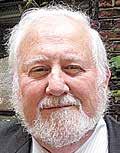
There are dozens of companies that want to buy our home. The phone calls are unsolicited and they go something like this. “Hi, this is Samantha calling. We found your house to be of interest to us. Would you be willing to sell you house?”

At first, I was interested. For the right
This tells me that they don’t know much about my home, and they only have an old version of my house on the internet. I ask her to tell me what they know about my home. Samantha says, “It’s a four-bedroom, three-bath house.” I then tell her, “You are looking at an old internet version because that’s not our house. Our home is new, and it has five bedrooms and five baths, so you have no idea about my house. Thank you for call ing,” and I hang up.
The next day, John calls offering to buy our house. I don’t want to go through the same story again, so I ask him if he has an offer he wants to make. The answer is always, “Well what price would you be willing to take to sell your house?” Sometimes I tell John it’s $3 mil
lion, sometimes I tell him that he doesn’t know about our home, and sometimes I tell him that he should be back in touch when he has an offer to make to me and my wife. That never happens, but the phone calls continue. I am now tired of them, for they are going nowhere, and we are not interested in selling our home. If you are reading this, please stop calling.
The second issue are all the emails I get telling me that I am a winner if I fill out a few questions about the com pany. I can be a winner at Home Depot, at Lowe’s, at CVS and a several others. Here is the email I received this morning from Walgreens: “Hello, friend, to show our gratitude to our loyal customer we made rewards for them. Complete the short survey about Walgreens to select your ex clusive offer up to $100 cash value. Take 30 seconds to complete the steps and con firm your reward.”
I confirm their offer, and it takes me to a website that is not offering me $100 but offering me a variety of items I do not
want. They usually say that supplies are extremely limited and there are only a few of the item left they want to give you. The item is free, but there is a shipping cost. I selected the ear headphones, and the shipping cost is $7.97. I have no idea of the quality of the ear headphones, and I don’t want them anyway. I also don’t need and don’t want the portable mini vacuum, the Wi-Fi video bulb, smart watch, robot vacuum cleaner or the Beats studio wireless noise headphones (that offer is already expired). Each has a ship ping cost and none of them are free. I also do not expect to win $100. There may be a winner, but I can assure you that it will never be me.
We have put these phone numbers on a “stop this phone call list,” but they keep coming. I have taken the time to put these emails on a “opt out of the emails list,” but they keep coming. I have given up trying to eliminate these pests. We are at the point of just hanging up the phone and immediately deleting the email. It is the easiest solution. ì








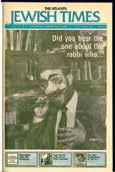

















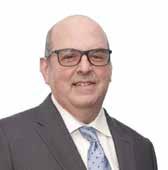





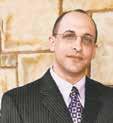















Register at communityofgiving.org




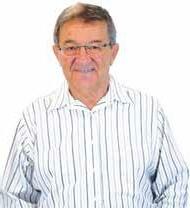
Empower lives. Strengthen community. This event supports the JF&CS Annual Campaign



